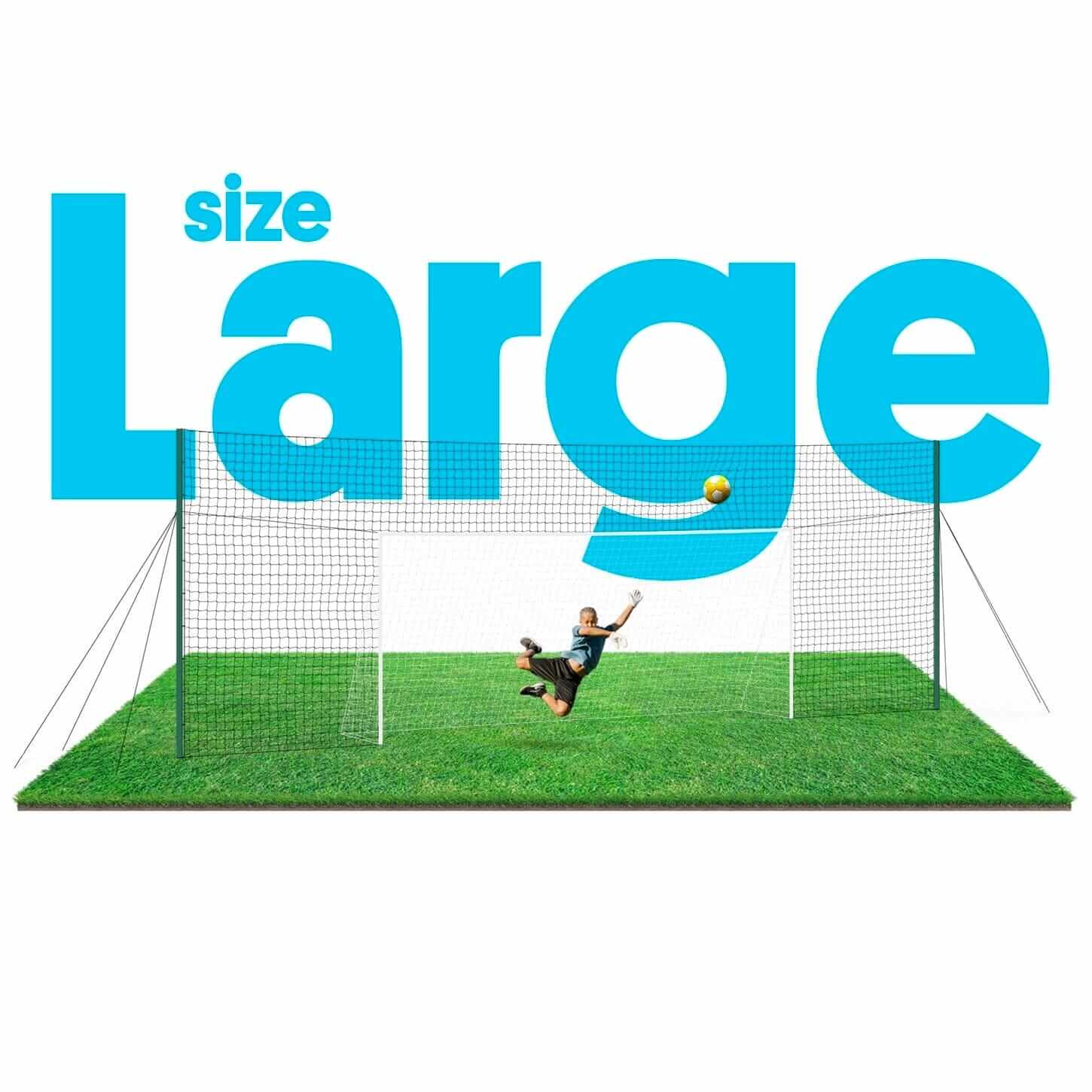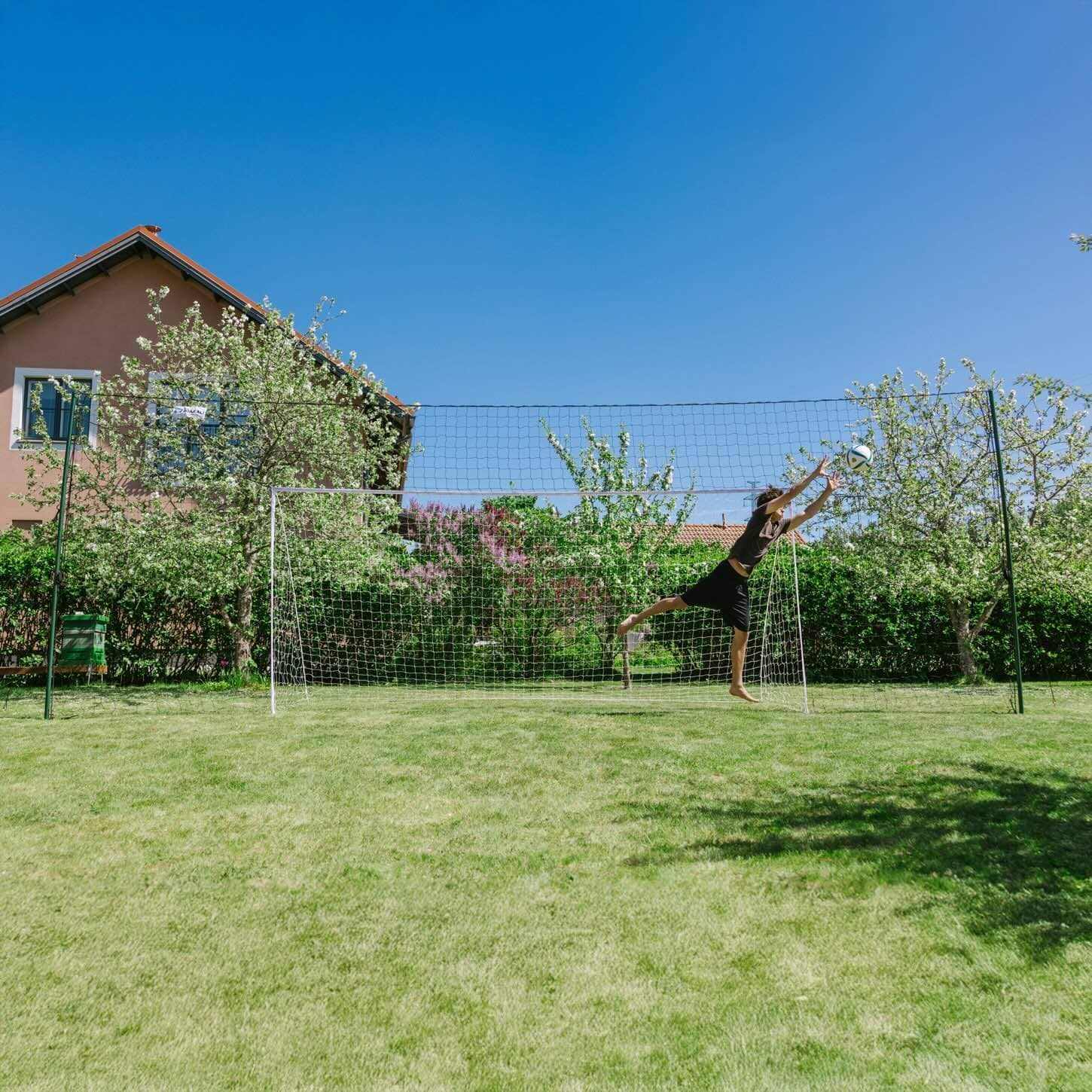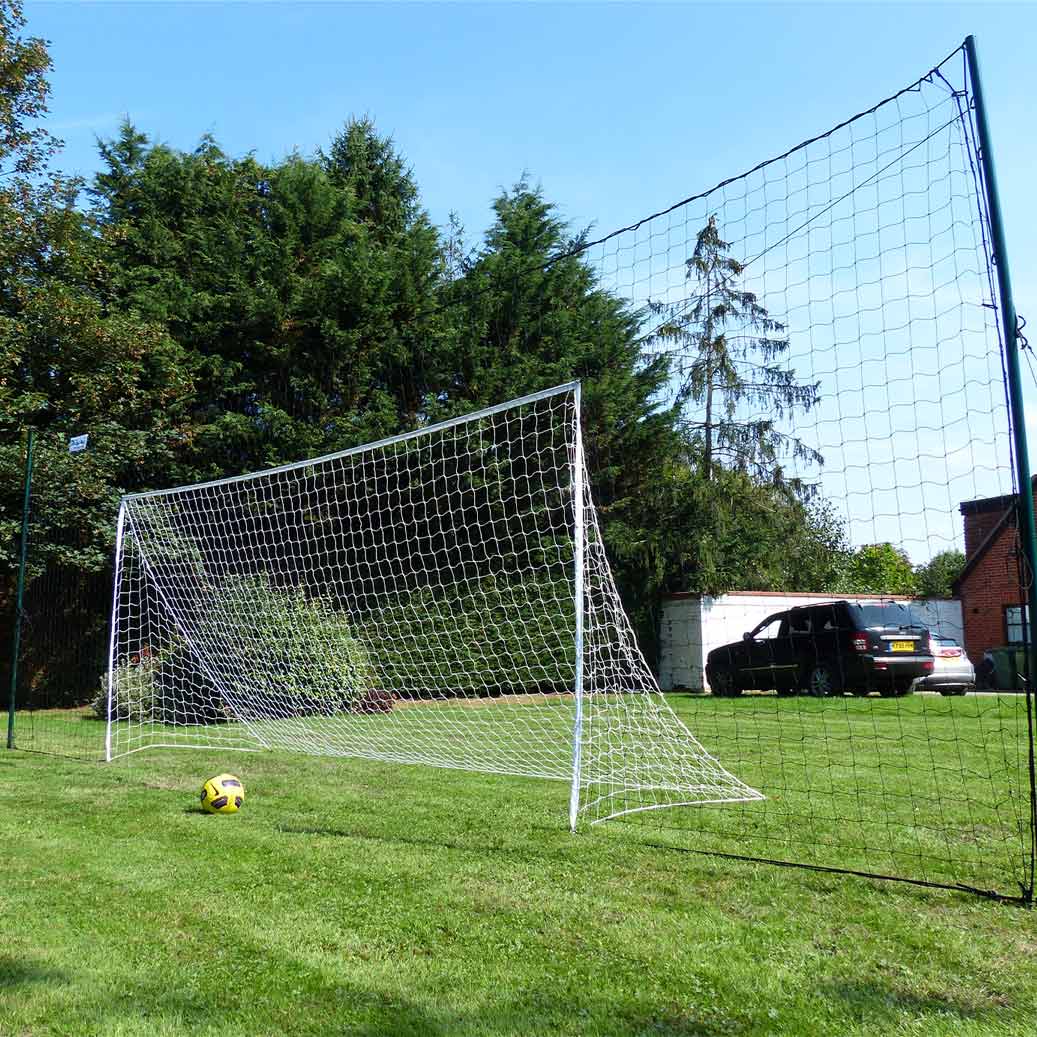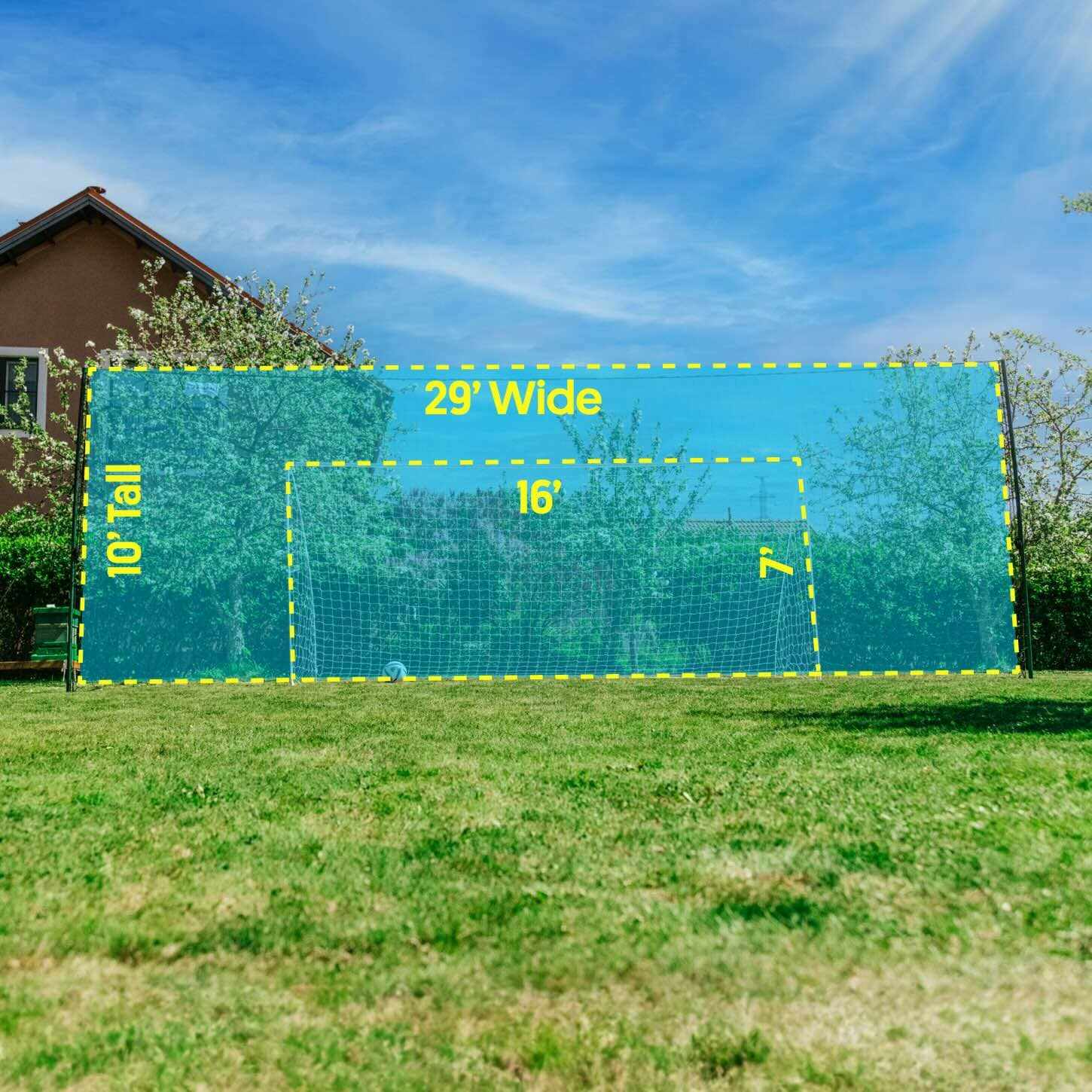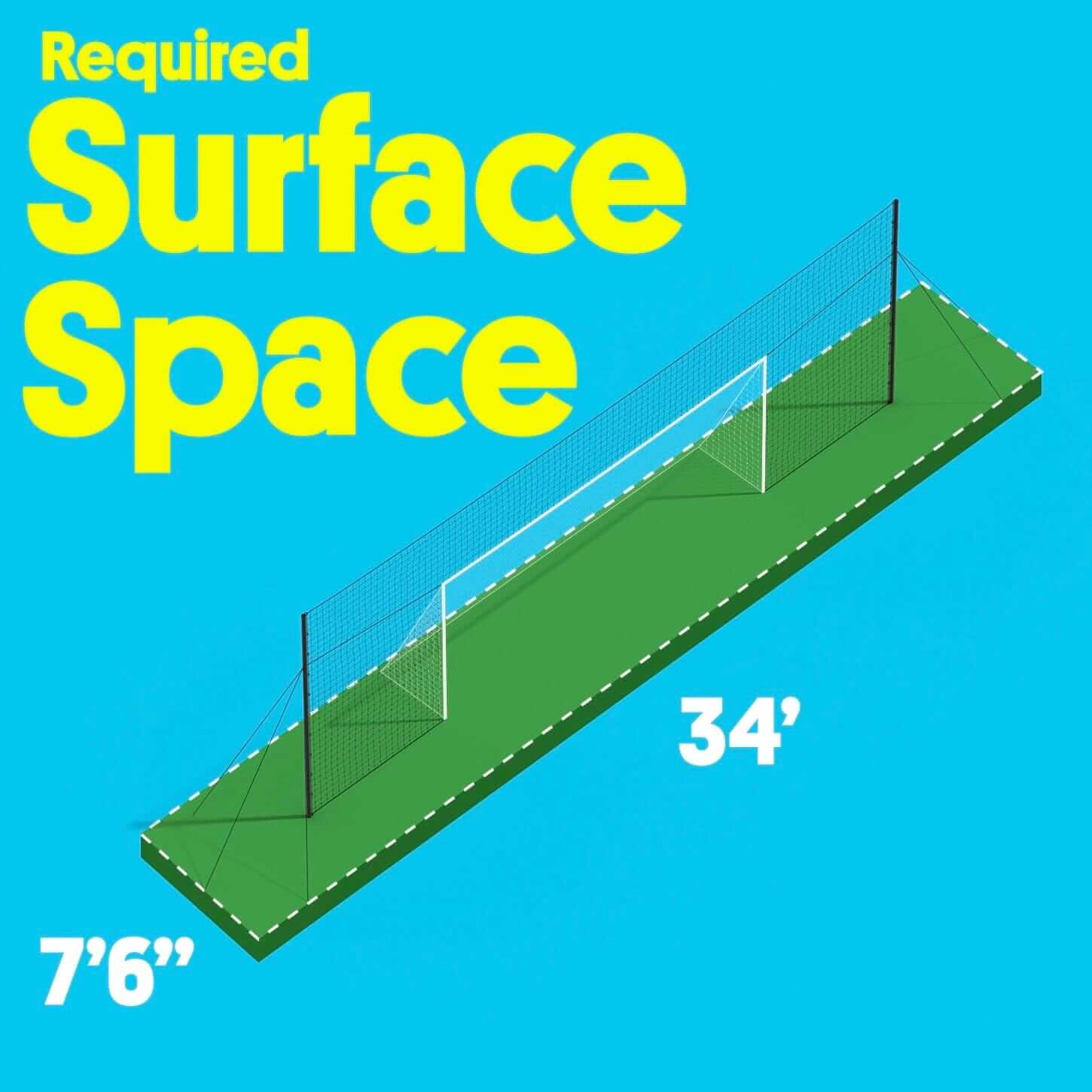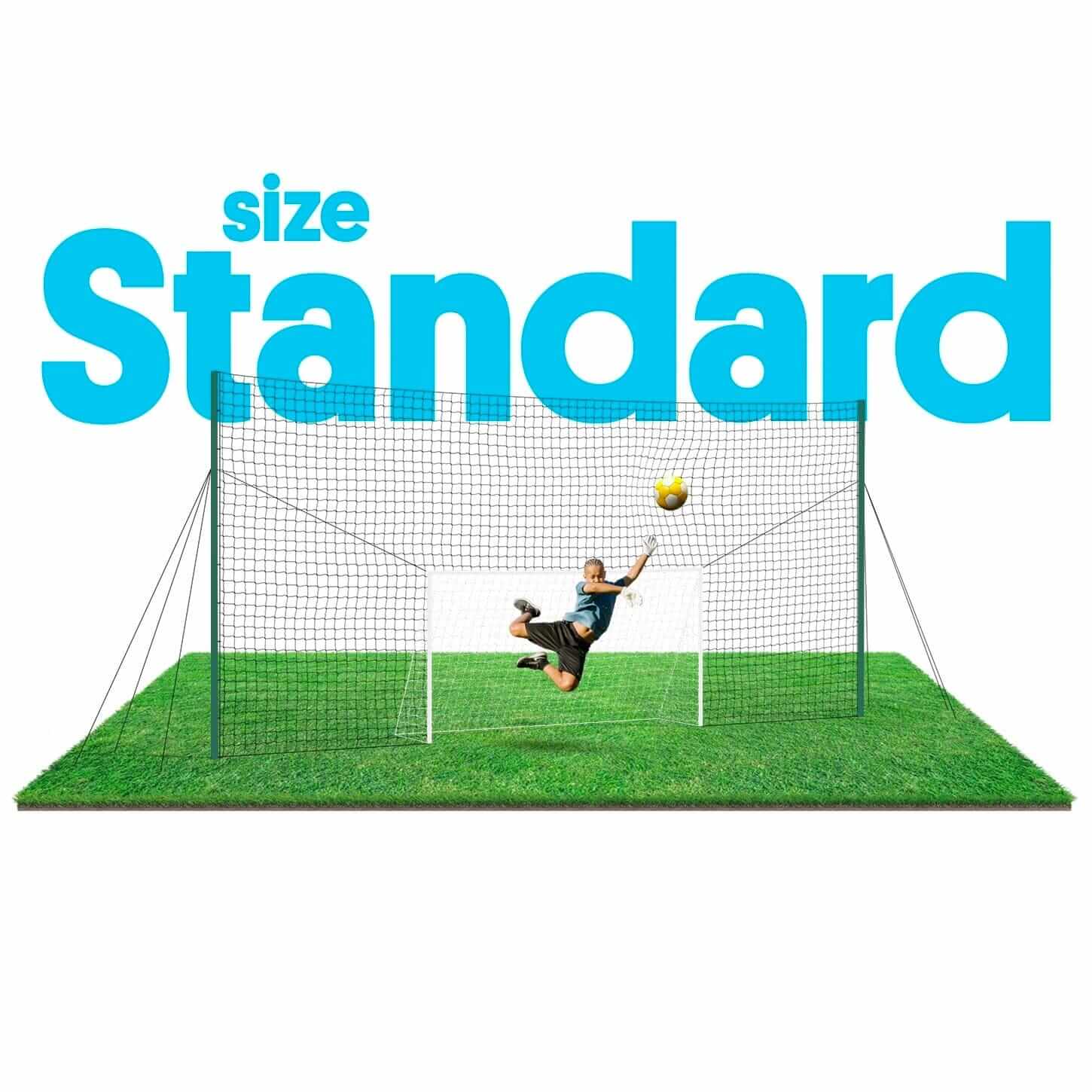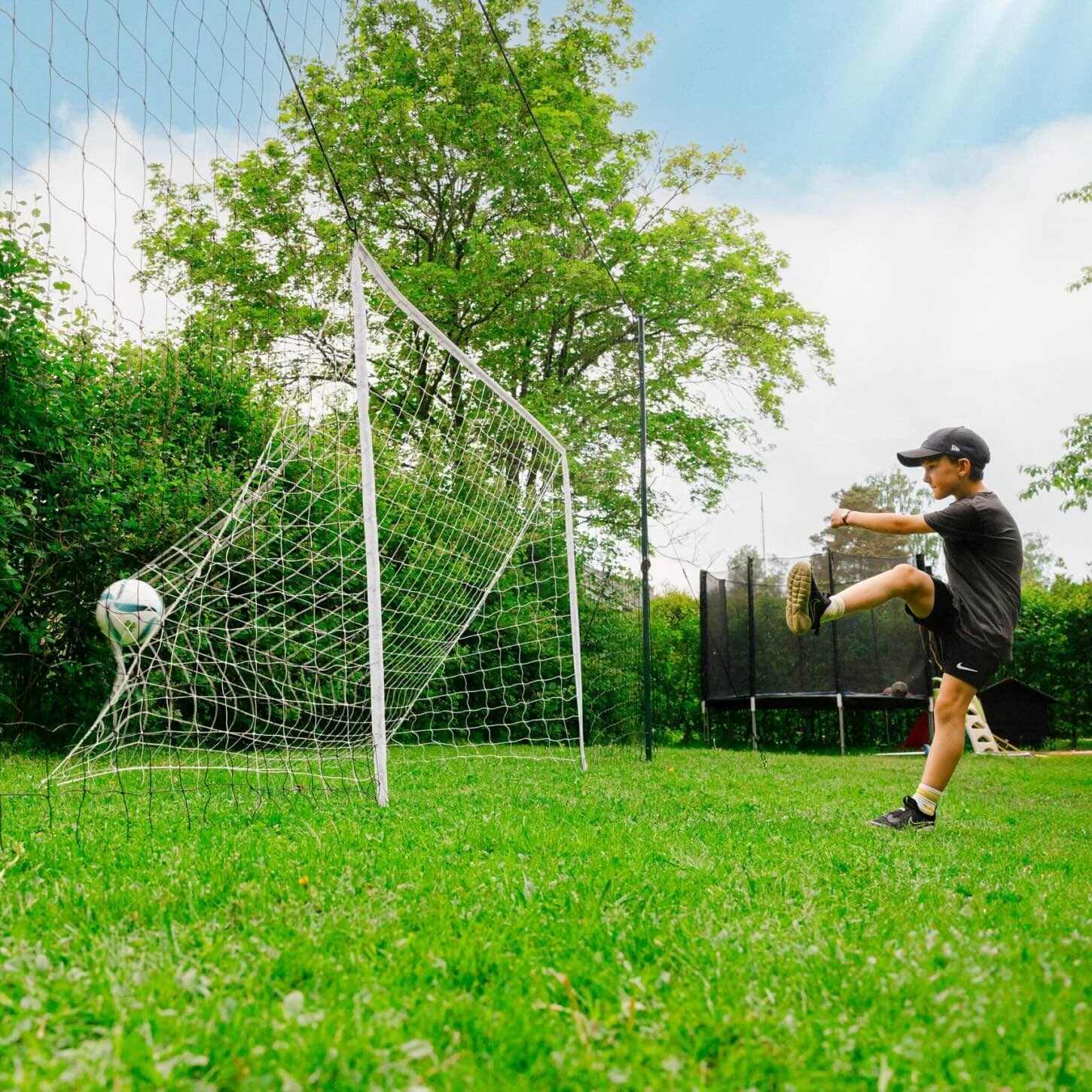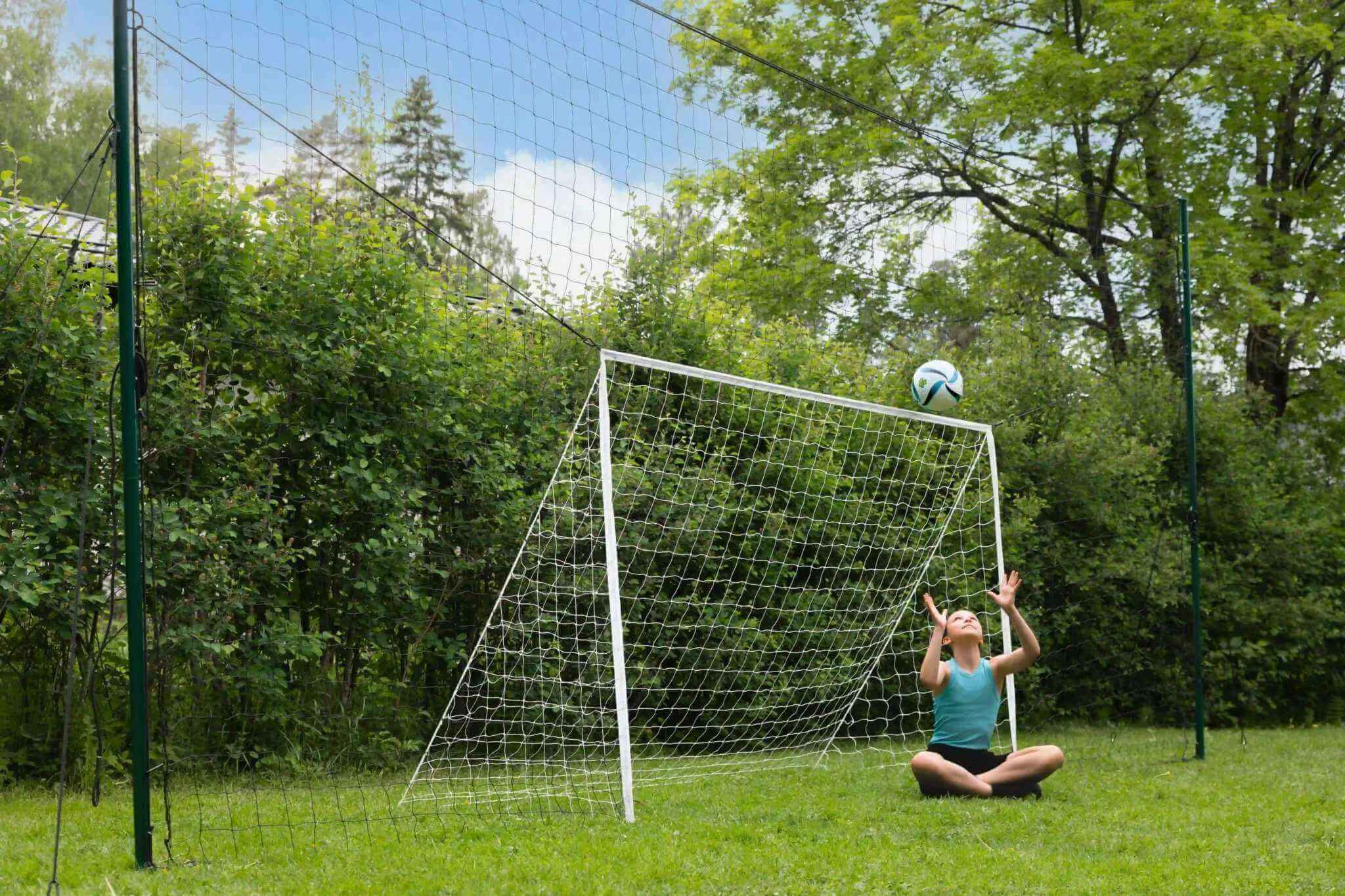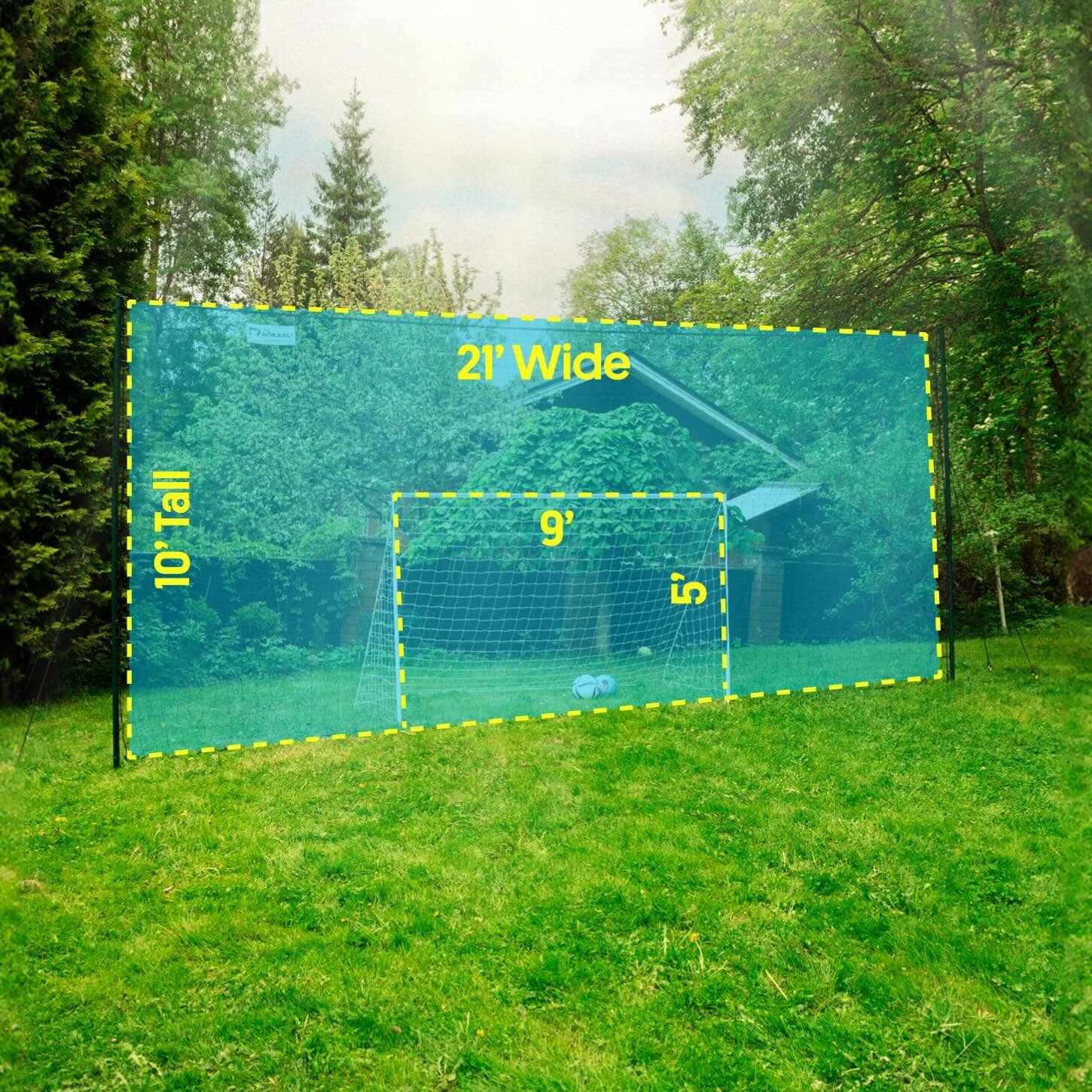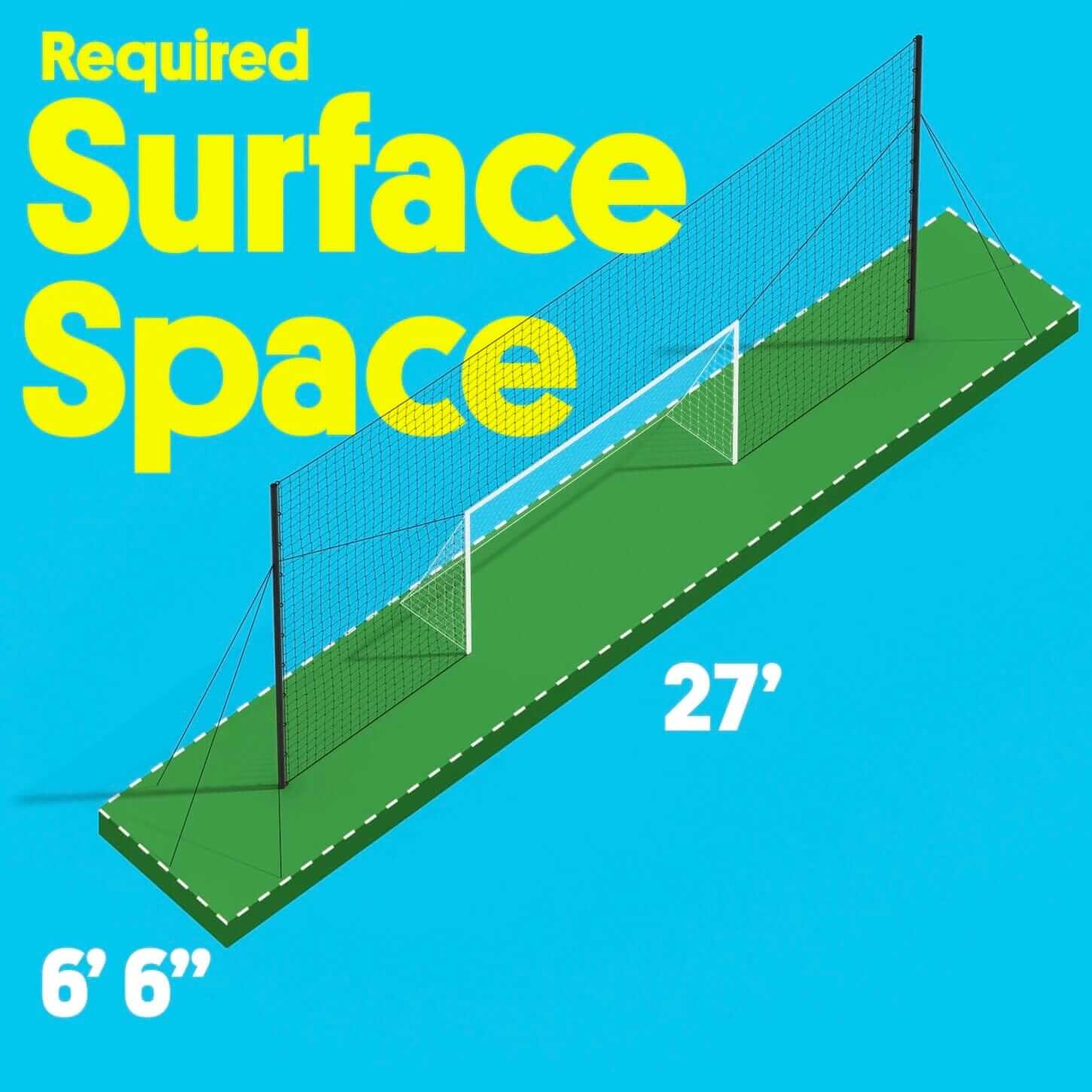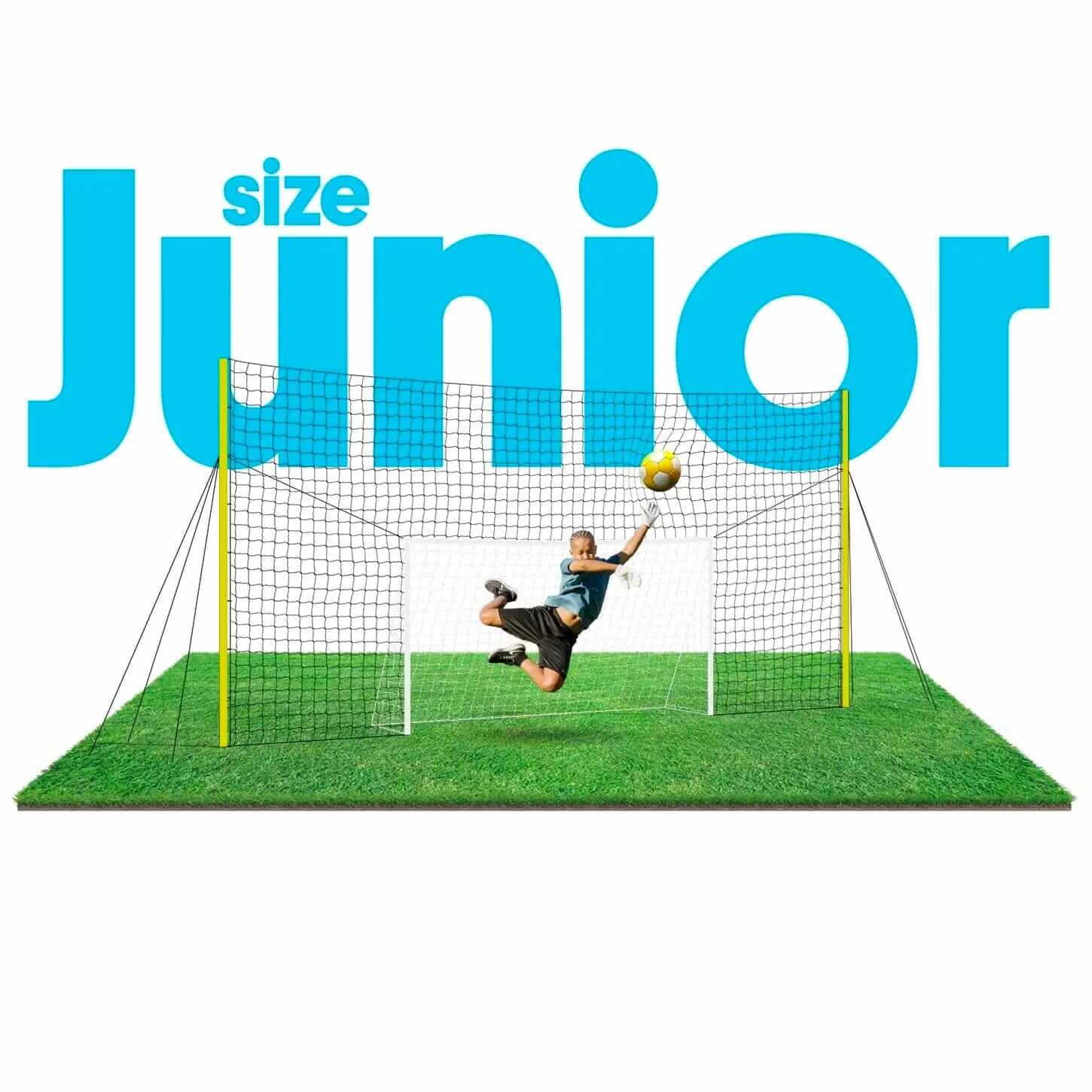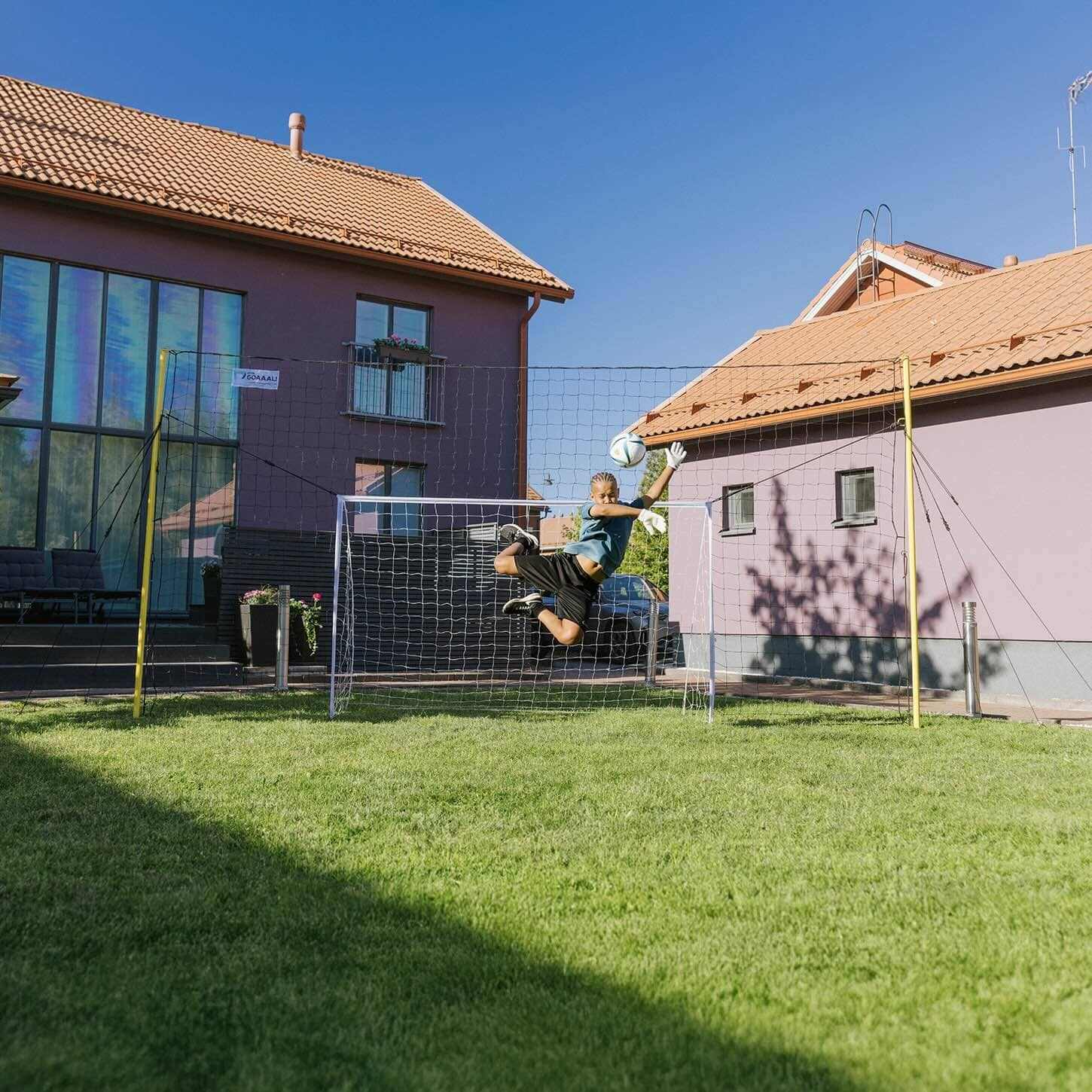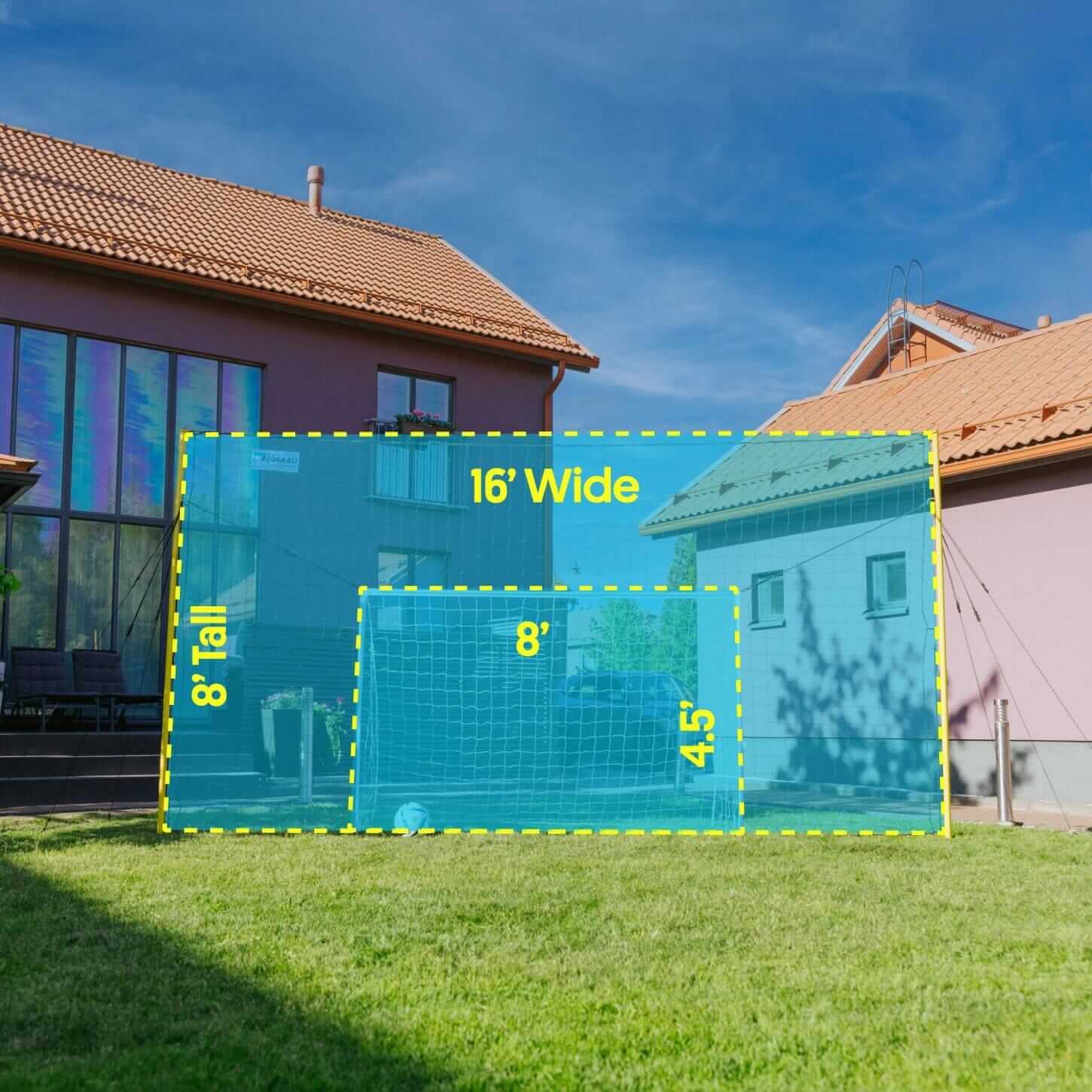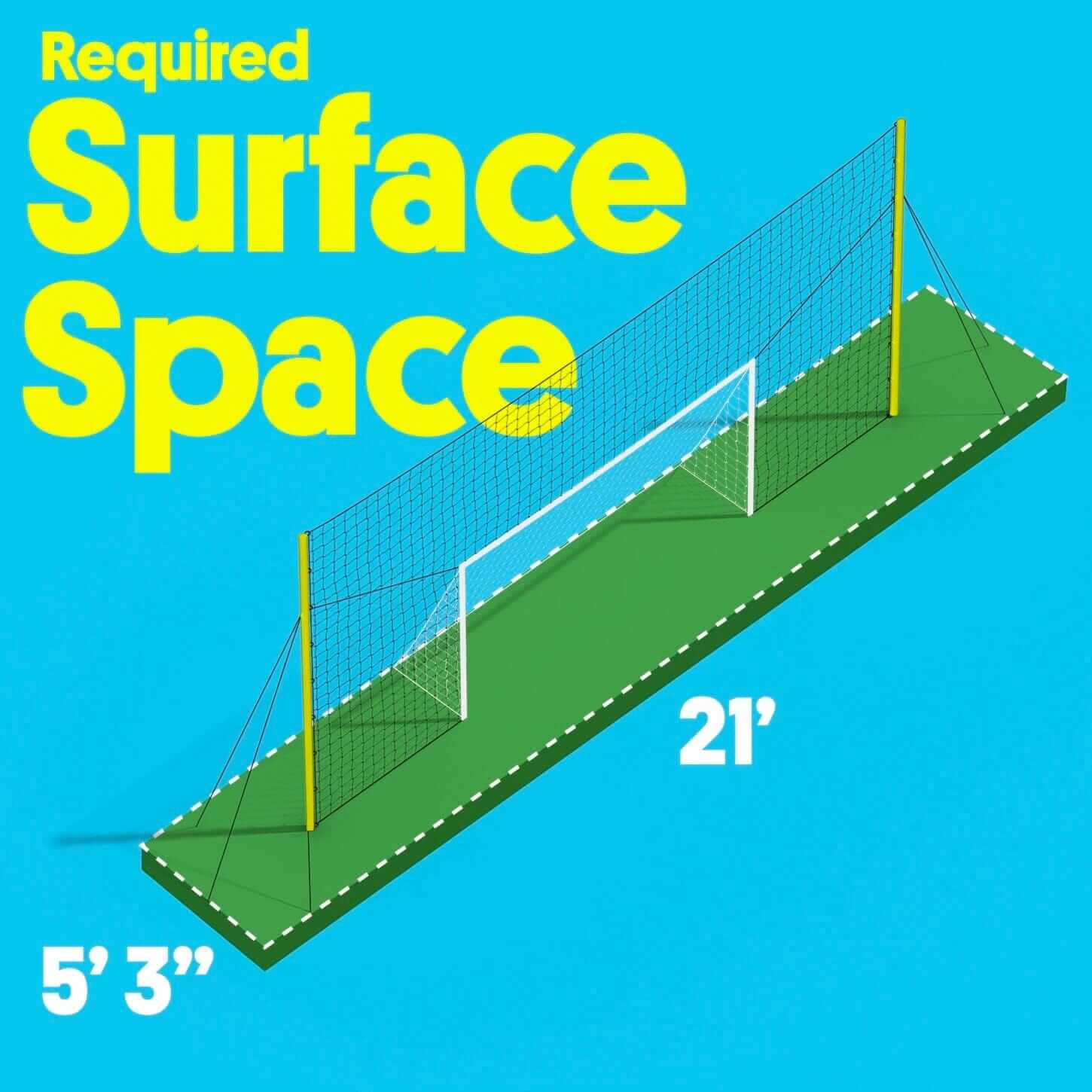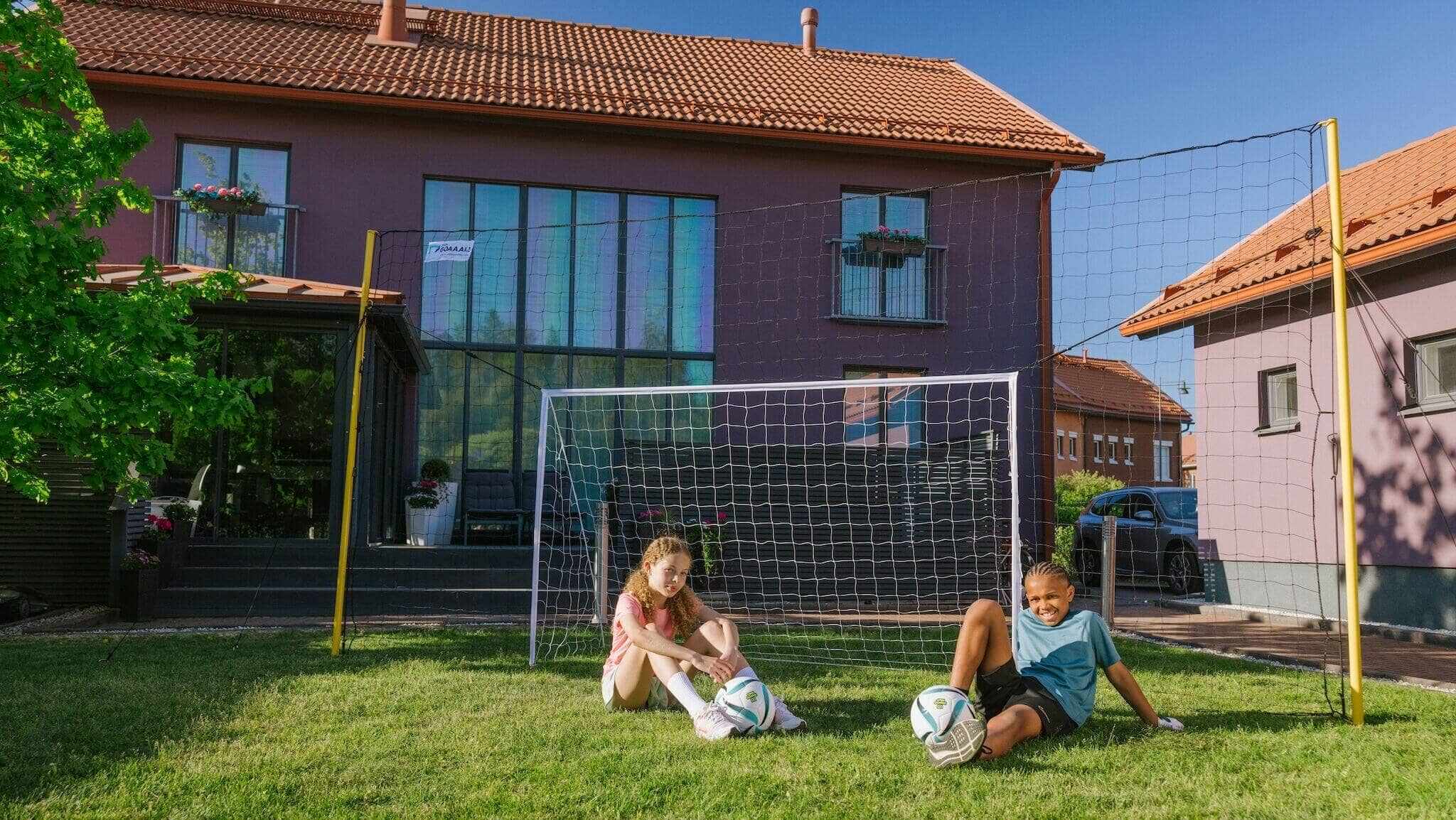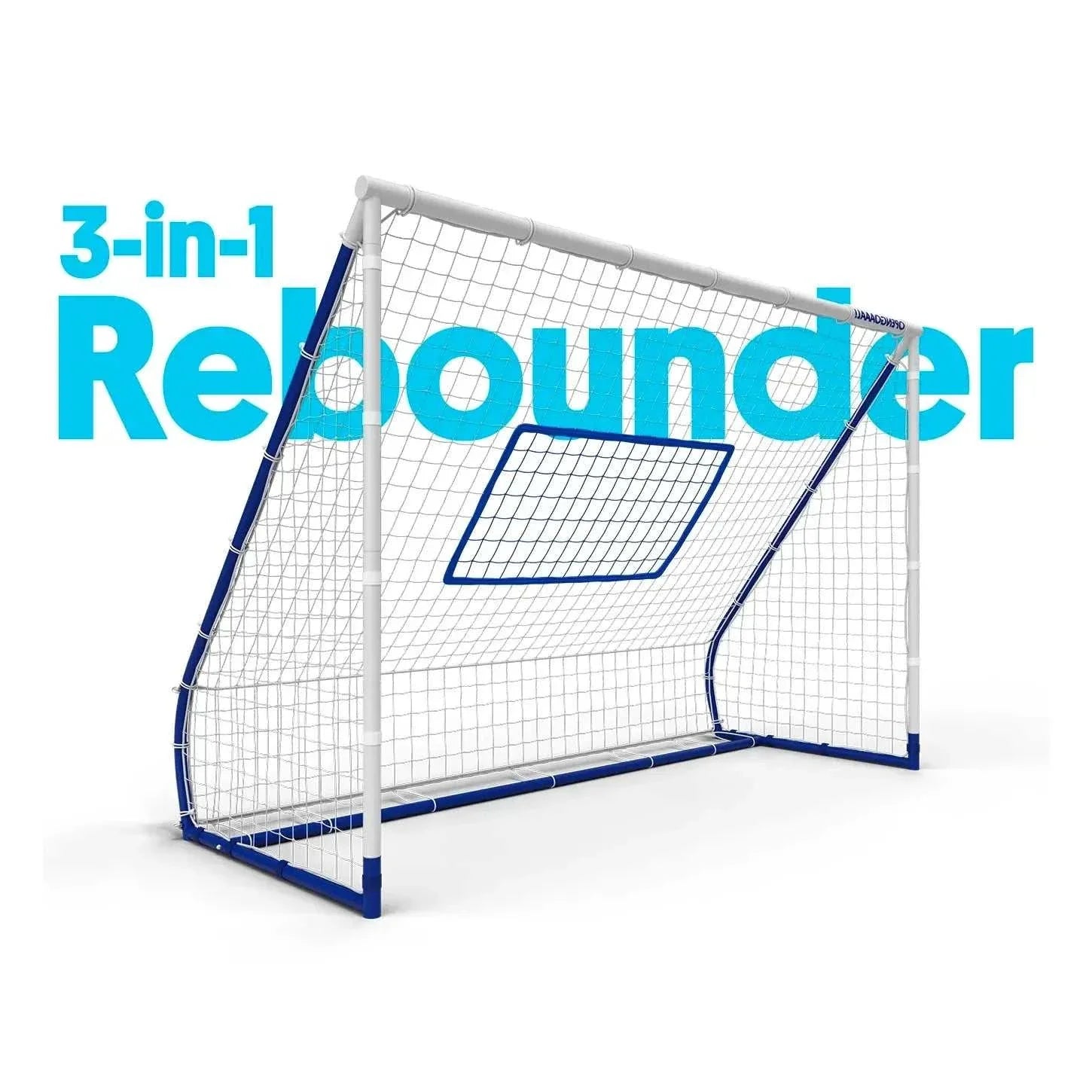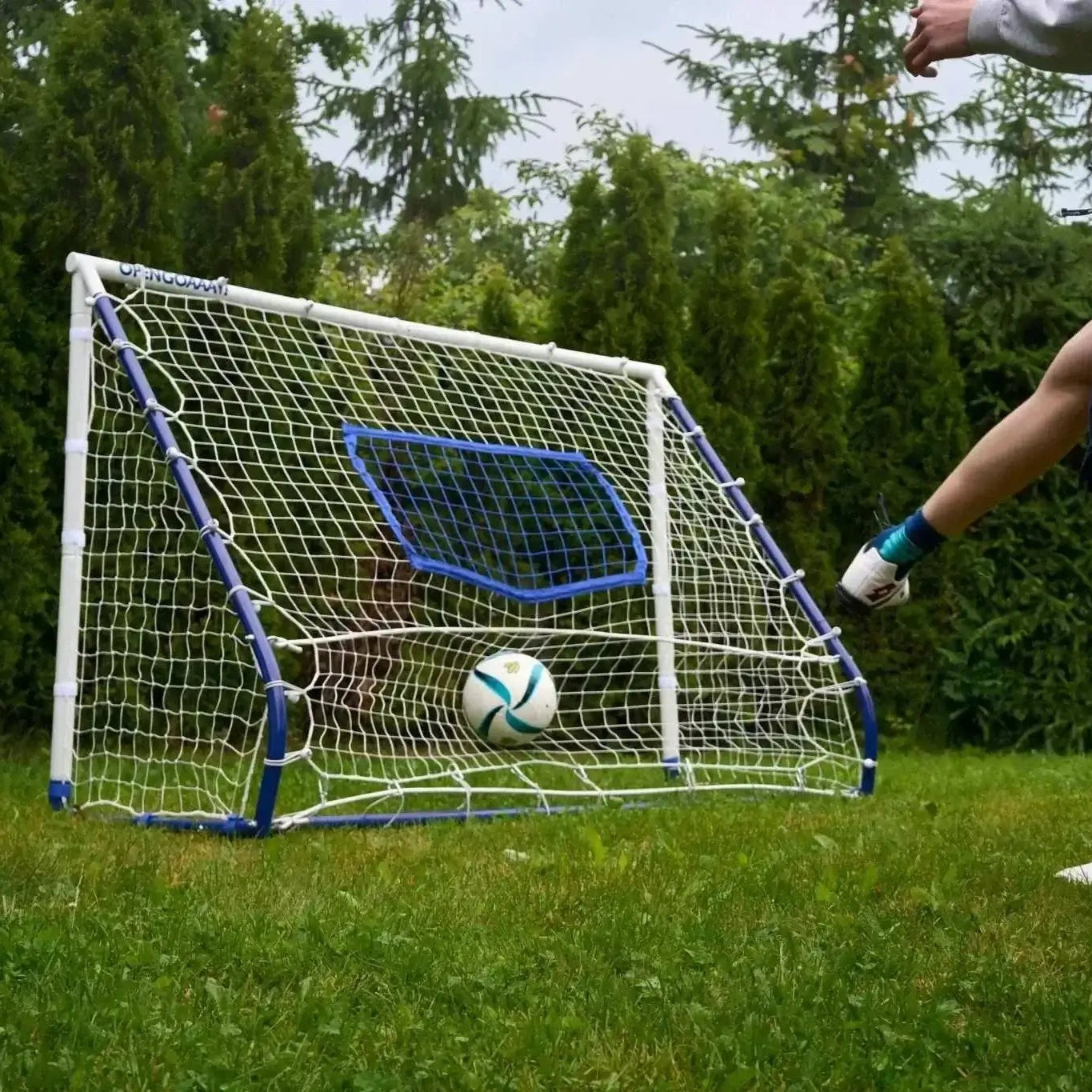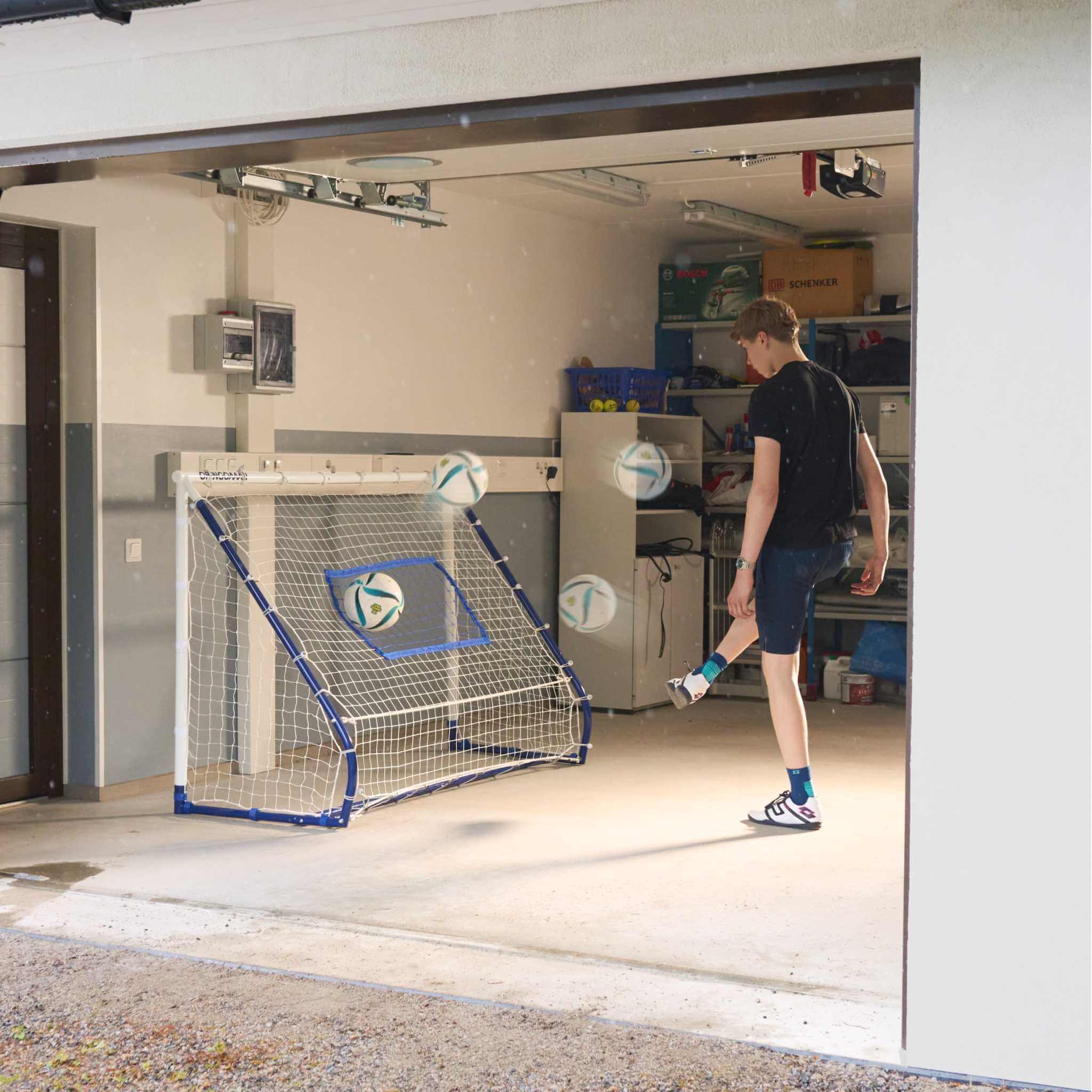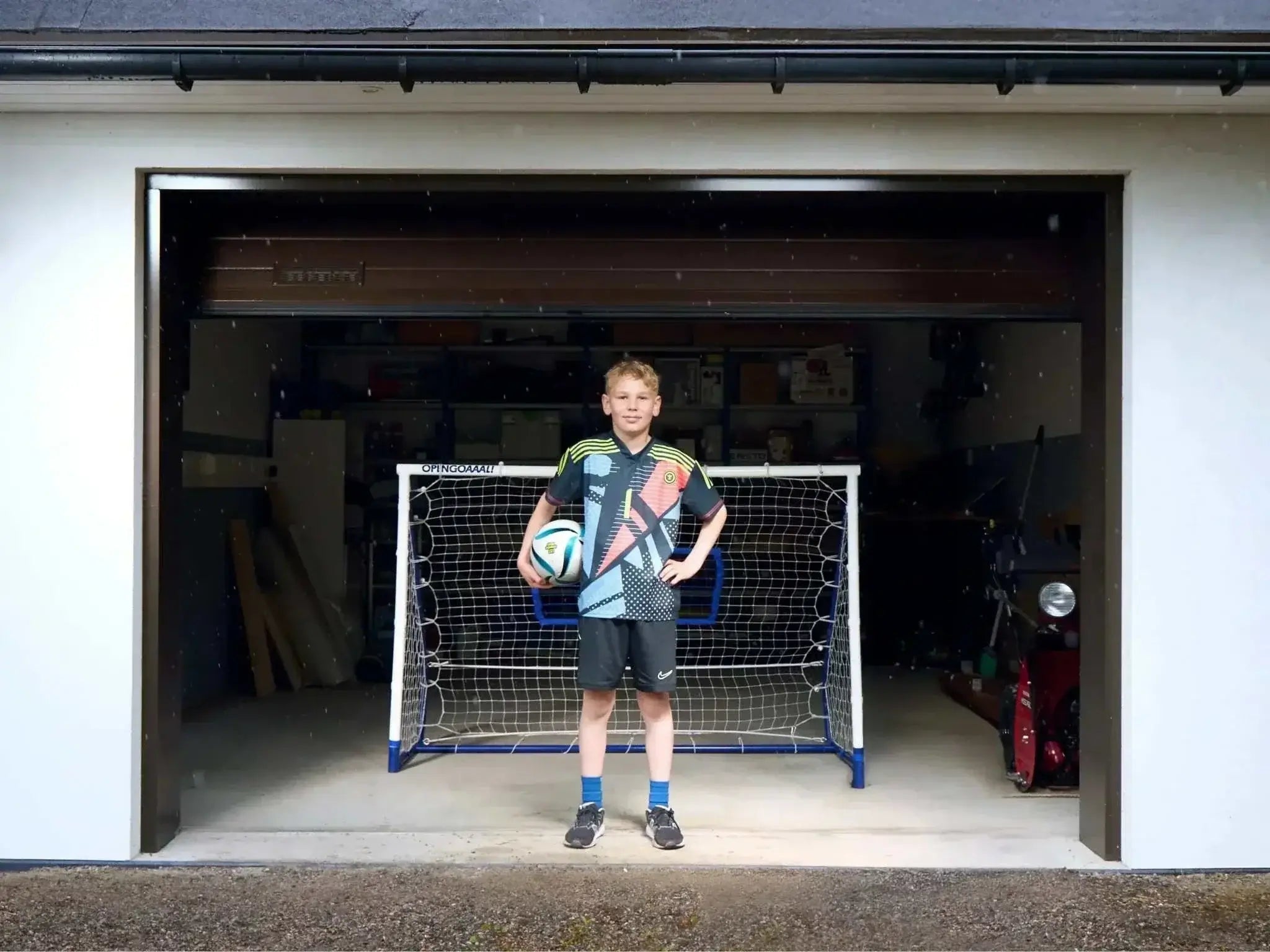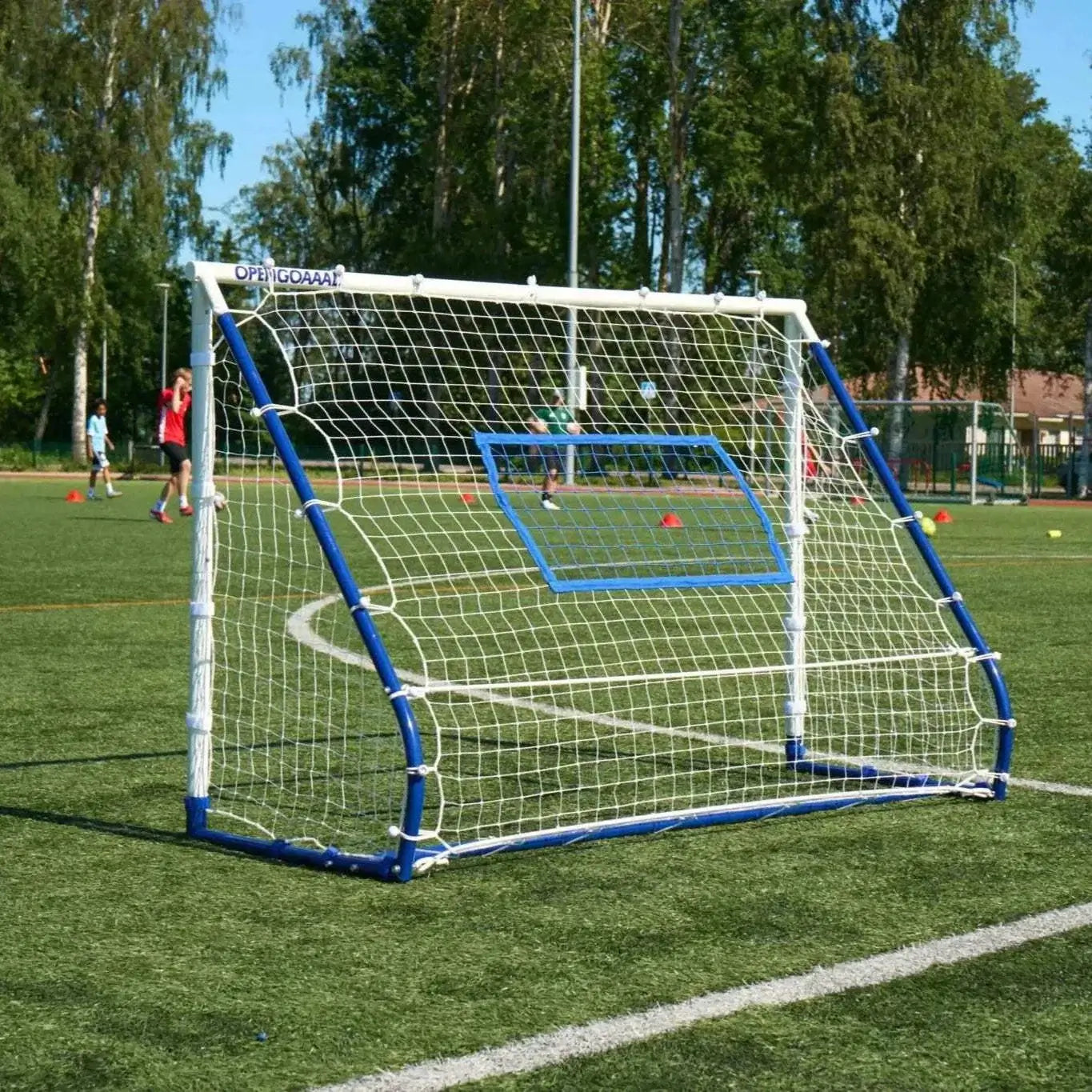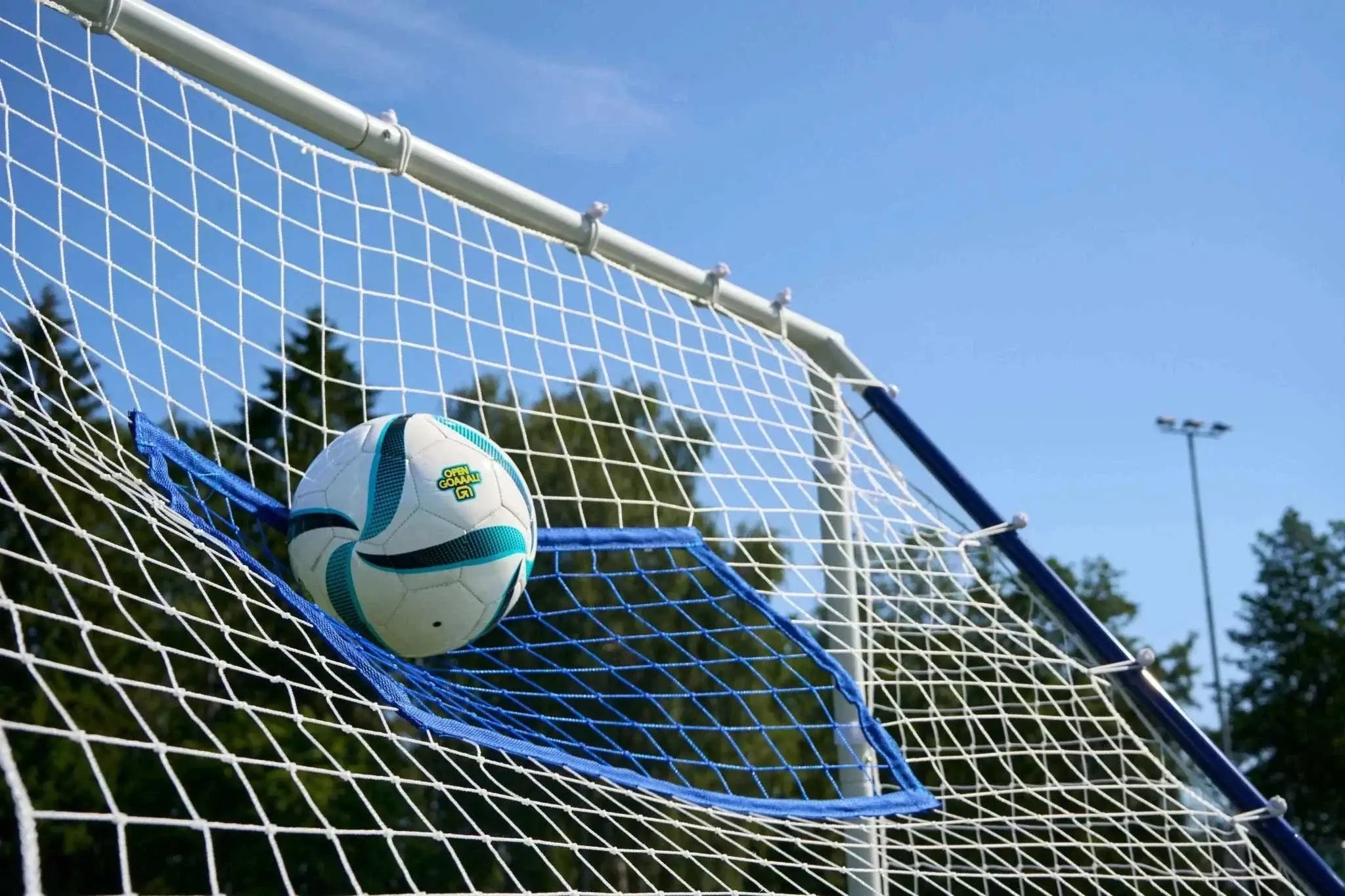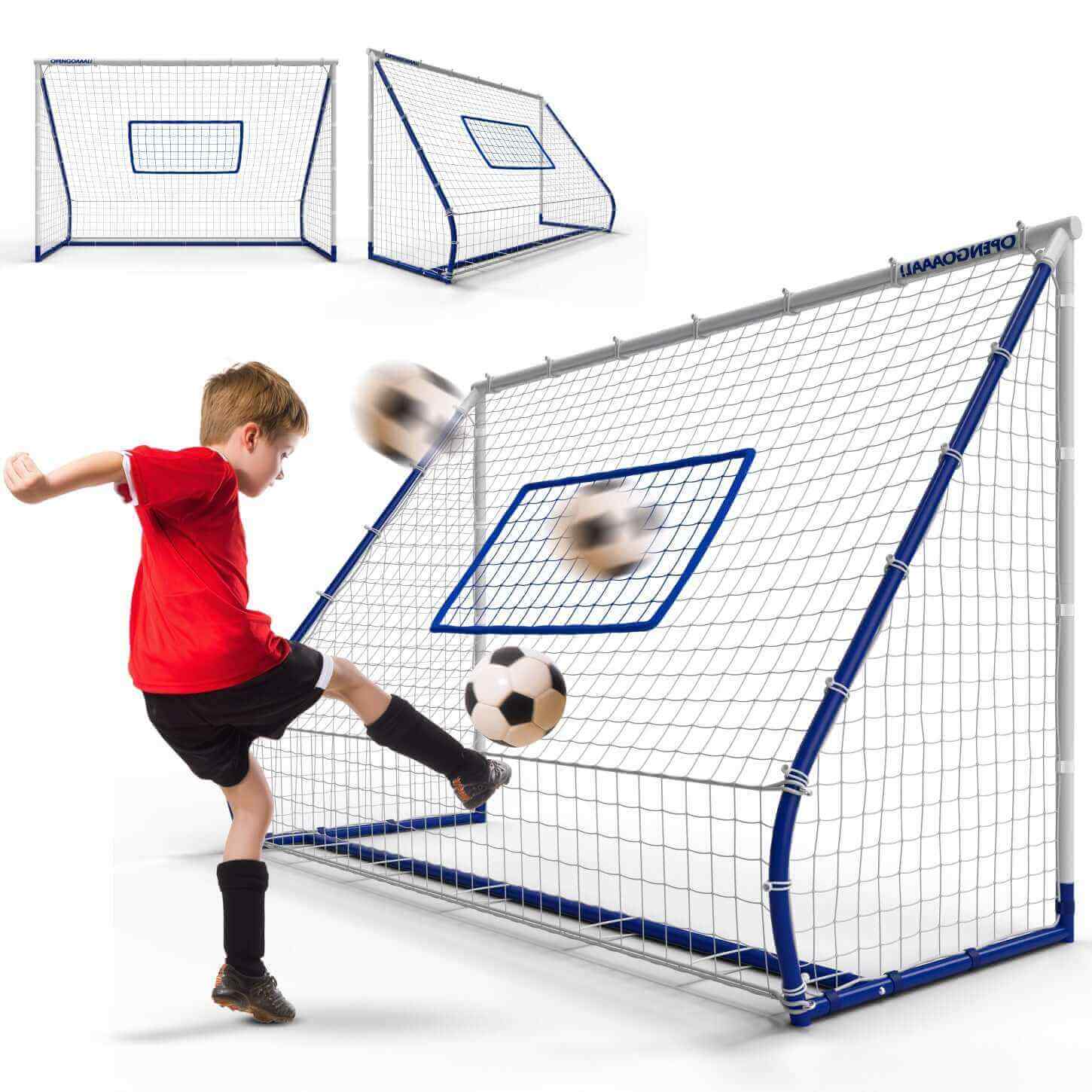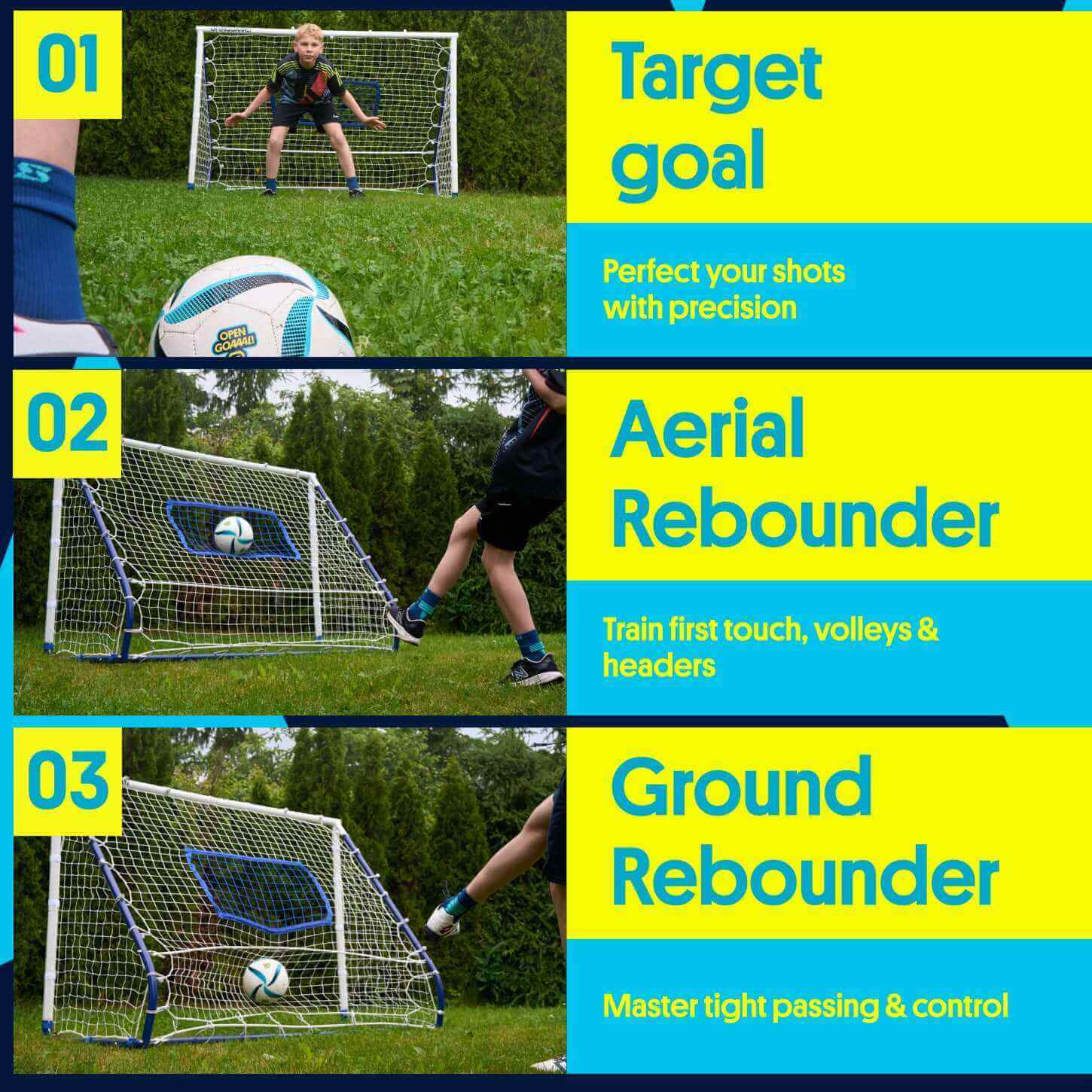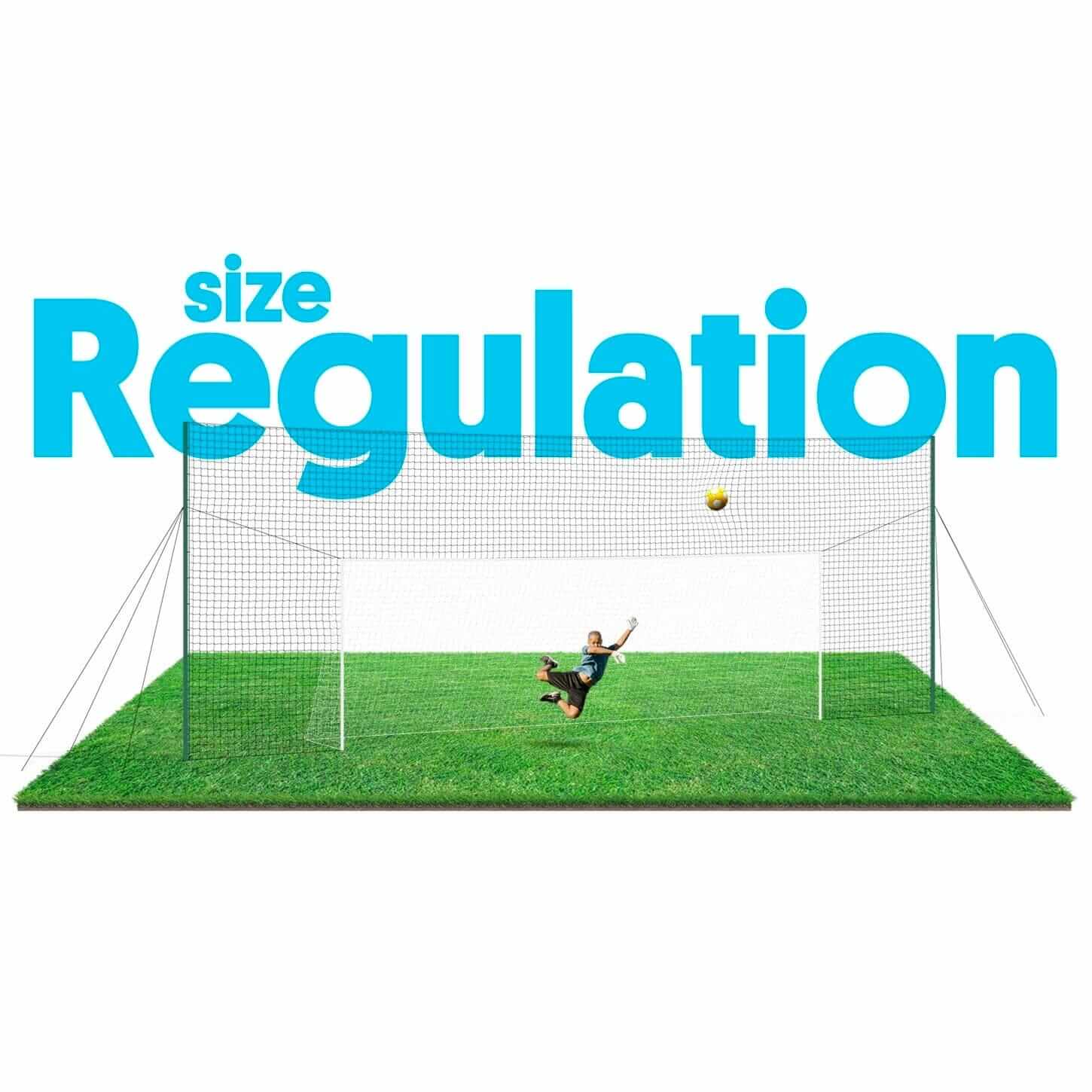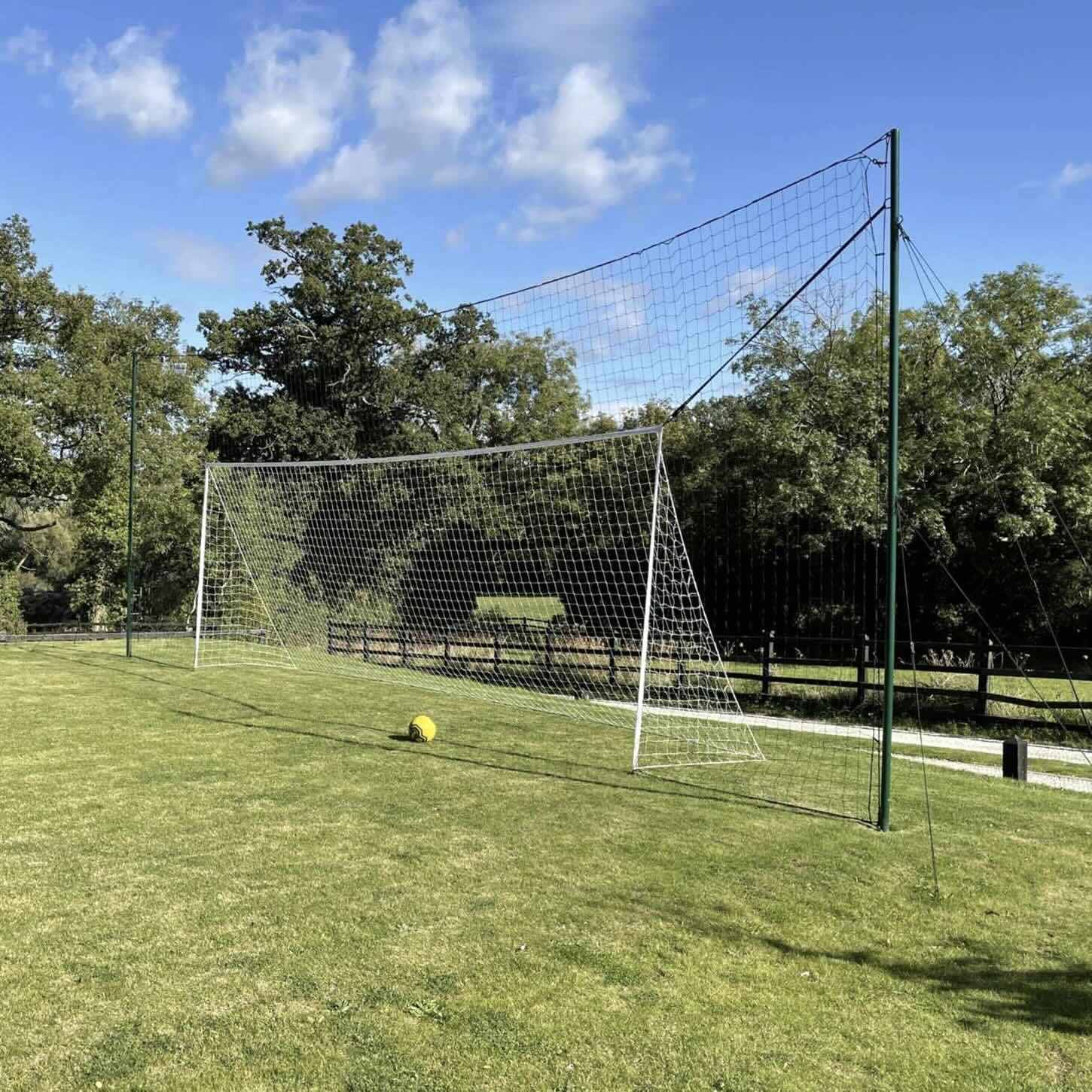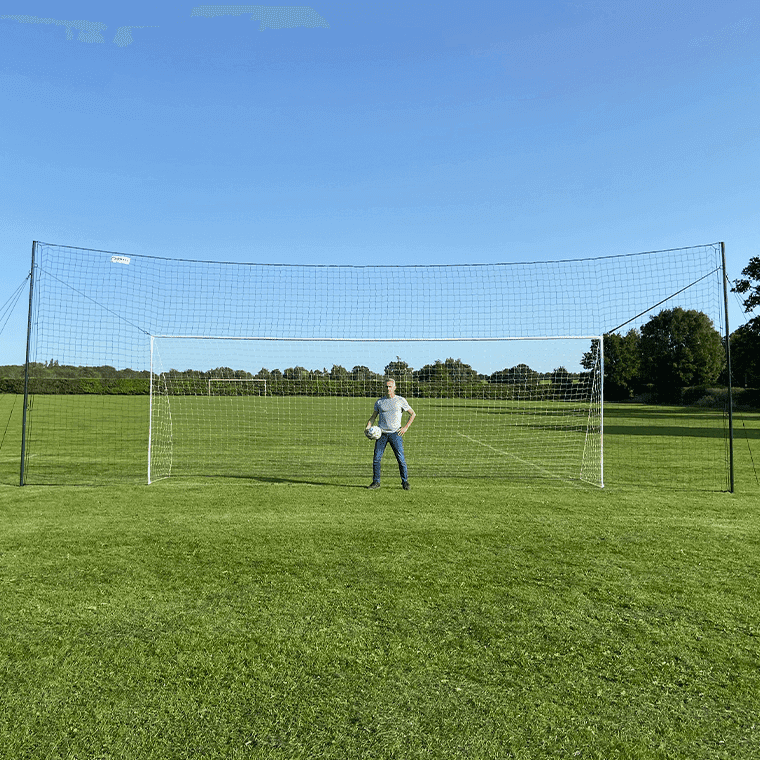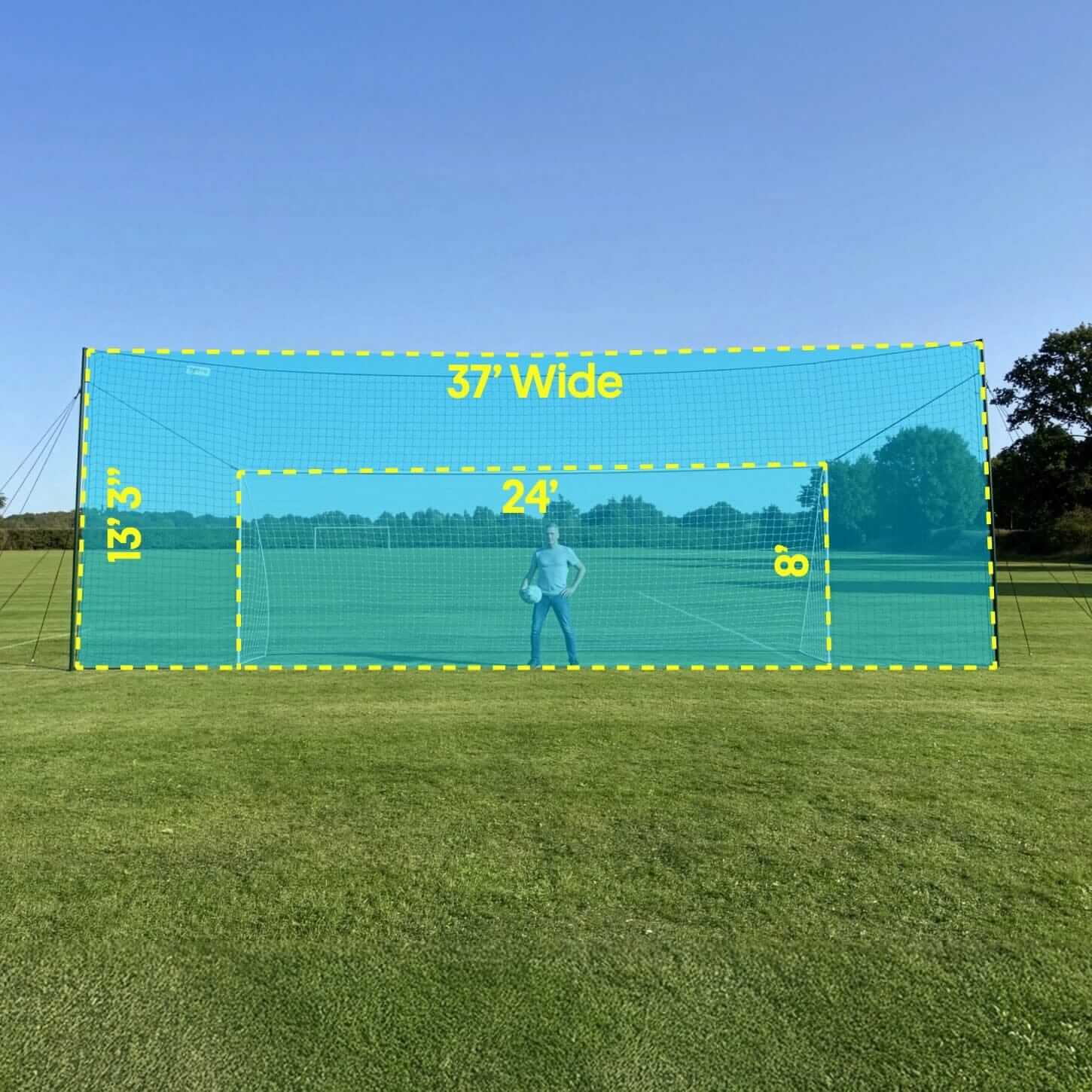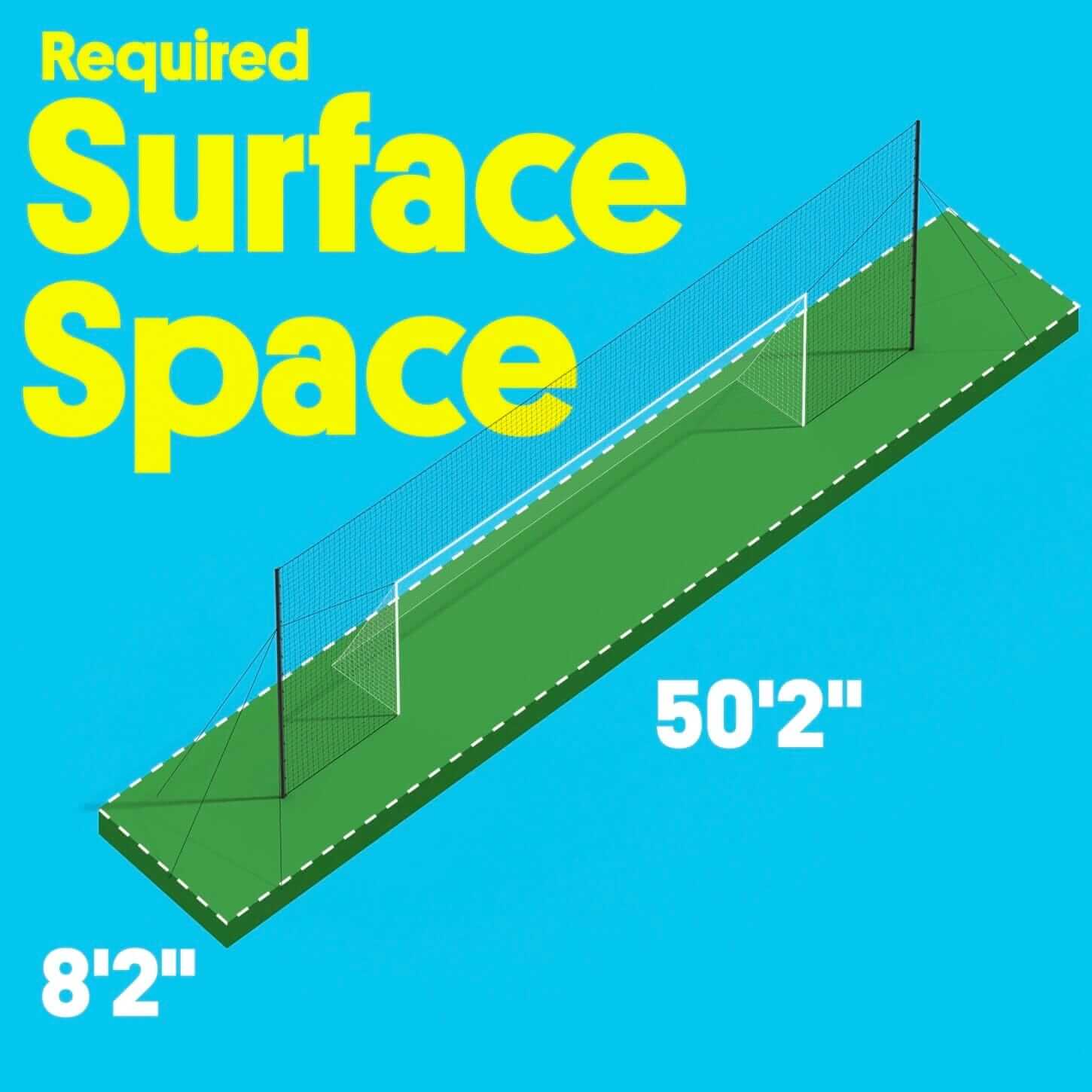Soccer players of all levels would agree that developing a confident and skillful first touch is one of the most essential skills to work on. It's the first touch you use to control the game's pace, get around an opposing player, and score a goal.
Most youth soccer players will spend countless hours mastering this skill during their developmental years.
If you haven't heard about Open Goaaal, check out our line of soccer goals with a built in rebounding backstop!
Here are some of our favorite drills you can use in practice to help youth soccer players learn how to develop first-touch skill sets.
Best First Touch Soccer Drills For U10 and below
Below are some great practice drills you can use to develop the first touch technique for U6, U7, U8, U9, and U10 soccer players.
Receiving Ball With Inside Of Foot
This basic drill for practicing receiving a pass with the inside of the foot is one of the top first-touch soccer exercises for this age group.

How to Play
Have your players stand in pairs about 4 feet apart, facing each other. Using only their outside foot, have each player, in turn, kick the ball to his partner.
The player receiving a ball should control it on his chest and then return it back to the kicker, taking care not to let it hit the ground.
Points for Improvement
Your players should make sure they lean slightly to one side as they catch the ball with their inside foot.
This first-touch soccer drill aims to develop the ability to receive a ball in stride and play it back quickly with their inside foot.
Outside Trap And Play
This is one of the top first touch drills soccer for under-10 players because it helps improve their coordination, balance, and reaction speed.
How to Play
Have your players stand about 10 feet apart, facing each other in pairs. The player on the left in each pair should have a ball.
Player A can pass to player B but cannot let the ball hit the ground before it is kicked back to him. Players should alternate as passer and receiver so that every player gets a chance to work with both roles.
Points for Improvement
Time yourself and have each player set a target of getting the ball back within 5 seconds. Players should use this time to practice their first touch, control, and speed of play.
Best First Touch Soccer Drills For U18 Youth Soccer Players
These first touch drills are appropriate for U11, U12, U13, U14, U15, U16, U17 and U18 youth soccer players.
Pass and Run Back
Here's a first-touch soccer drill that will work on your player's coordination and overall fitness levels. It combines passing skills with the speed of play.

How to Play
Place your players in pairs about 8 yards apart, facing each other. Player A passes to player B and runs back to collect the ball.
Player B does not kick the ball back but instead passes it again for Player A to control his chest, turn and play a return pass to B. Players should keep this drill going for a set period or number of kicks.
Points for Improvement
The goal is for each player to improve their speed around the field and their first touch and playmaking ability.
Use your watch or set a target number of passes before starting again. Keep changing the roles so that both players are equally challenged and get ample playing time in both roles.
Receiving Ball With Outside Of Foot
Another example of a first-touch soccer drill will help your players refine their control and ball-receiving with the outside of their foot. For this exercise, you'll need a partner to work with.
How to Play
Have each player in pairs face each other about 4 feet apart. The player on the right should have a ball at his feet. Player B plays a pass to the player on the left.
This time, Player A must control the pass with his outside foot and then play it back to Player B with his inside foot.
Players should keep repeating this passing pattern until they get it right or time is up. Then they should switch roles and repeat.
Points for Improvement
Make sure you and your players all come to a stop before the next player passes. Encourage players to keep their heads up and watch the ball into their feet.
Encourage quick and accurate passing. Require your player to call "Control" each time they receive a pass.
Best First Touch Soccer Drills For Collegiate & Adult Soccer Players 19-24 Years Old
Trap, Roll, and Play
This drill for improving the first touch technique is similar to the trap and roll drill, but its higher complexity and slightly longer. You'll have your players perform three first touch drills soccer before they can play again.
How to Play
Place your players in pairs facing each other 2 yards apart. The player on the right has a ball at his feet. Player B should kick the ball towards the player on the left, who must quickly throw it back to B.
Player B then has to repeat this pattern three more times before he can resume play. Make sure that only one of your players is ever allowed to pass or shoot at a time while rolling and trapping.
Points for Improvement
Players should call "Control" each time they receive a pass. Encourage speed, smoothness, and accuracy in their movement and reaction to the ball while rolling. Make sure they keep their head up and watch where the ball goes as soon as it's received.
If you can, have your players work with more petite balls to simulate a game-like situation when in first touch games soccer. There should be no pressure on them to win the drill so they can develop their skills without pressure.
First Touch Drills for Beginners
These drills are recommended for beginner soccer players of any age.
Wall Passes
This is a simple one-handed first-touch soccer drill for beginners. It's easy to learn and can be easily divided into individual work sessions.

How to Play
Have your players stand about 4 feet apart, facing each other with their back to a wall, bench, or stand. The player on the left should have a ball at his feet and face away from you with his left foot behind him at the bottom of his foot.
The player on the right should stand with his back towards you with his feet together and facing particularly towards the wall.
Player A passes to player B then turns to face B, kicking the ball backward with their right foot while keeping their left foot in place.
Player B controls the ball with their right foot and, with the ball at their feet, passes it back to player A who has turned to face them and is ready to receive it. Player B should have their left foot pointed towards the wall.
Points for Improvement
Make sure your players concentrate on keeping their eyes up as soon as they receive a pass to anticipate a second pass better.
Also, ensure they keep their shoulders down and not shrug or raise them higher than normal. Ensure that both players stay low in their stance when receiving a pass, particularly player A.
Touch and Go
This is a simple and fun 1st touch drill for beginners of any age. It's also a great way to keep warm as you begin first touch soccer training or playing soccer.
How to Play
Make two lines of your players facing each other about 5 feet apart. The player in each line has a ball at their feet. Make sure you have enough balls for everyone, and the balls are the right sizes for your players.
For example, the small to medium-sized balls should be used for younger players while their older counterparts should use the small ones.
The first player in each line has a ball at their feet. The first player in each line passes the ball to another and then runs to get the ball back, keeping it away from his opponent.
Points for Improvement
Encourage your players to keep their eyes on their ball as they run after it. Encourage quick reactions and passes between players as they keep control of it. Keep running until you or your players feel too tired and then stop and change lines so everyone gets a chance to play all roles.
First Touch Drills for Competitive Soccer Players
Quick Thinking Passing
This is one of those soccer drills to work on first touch soccer for experts that will challenge the best players. It flies in the face of the adage "Control your first touch" and challenges your players to use their speed and skill rather than relying on their technique alone.

How to Play
To begin, have your players pair up. Player A should stand over a ball while Player B stands about 5 yards away from them, facing away. Player A kicks the ball past player B, who must flick it back with his foot before he turns to face you.
When this happens, player B must complete his turn and trap, roll or control the ball before passing it back to player A who has moved to receive it.
Points for Improvement
Encourage your players to stay low and on their toes as they turn and receive the ball. Have them call "Control" each time they make a pass, trap, roll, or control the ball. Make sure they're looking at the ball as they turn to anticipate where it will be coming from.
Make sure you have them call "Control" each time they make a pass, trap, roll, or control the ball. Make sure they're looking at the ball as they turn to anticipate where it will be coming from.
Long Throw to Wall Pass
This drill will test your players' ability to throw the ball with accuracy and speed, as well as their soccer first touch technique. Of course, practice helps, so don't be afraid to get a few balls.
How to Play
Make two lines of players face each other 5 yards apart. The players in each line should have a ball at their feet. The player on the left has a ball at his feet and faces towards the wall while the player on the right faces away from him and towards you, with his right foot behind him.
Player A throws or kicks the ball at player B, who must then trap, roll or control it before passing it back to player A who has moved to receive it. Player A has the ball at their feet when they receive the ball.
Points for Improvement
Encourage your players to keep their eye on the ball as it is being passed back to them. You may also ask them to call "Control" each time they make a pass, trap, roll, or control the ball as you progress because this is an advanced drill, and you can easily get into a rhythm of saying it every time they catch or control the ball.
Ensure they keep their shoulders down and connected to their hips when catching and controlling the ball.
First Touch Drills with Equipment
4X4 First Touch Game
This is a fun 4-on-4 game that tests your players' ability to quickly control the first touch and then hit the ball at top speed. It also ensures the players understand what is first touch in soccer.
How to play
Get four teams of four players and let them divide up, so each team has two pairs. The goal of the exercise is for each team to control the ball in their half (4X4) for as long as possible, trying not to let the opposition get it.
Play with three substitutions per side throughout the exercise or until one side is unable to keep up for whatever reason. Each minute the winning team is switched with one of the losing teams. This drill can be completed using a normal soccer goal or a training soccer goal.
Points for Improvement
You may ask your players to attempt and beat their own previous time, or you can have a mark in place and have them compare their performance against the time they previously set themselves.
If you use a chalkboard, ask your players to write down the score and mark it off as the exercise progresses. You may also allow your top scorers to submit their times prior to the exercise so that you can show them where they stand relative to each other.
Using a Wall and Cones/Markers to Mimic the Feet of a Defender
This drill will help you work on your players' first touch while playing in a defensive position. These first touch soccer drills is also helpful when you want to improve the first touch of attacking players who will be playing in a defensive position.
In this case, it simulates the conditions a player is likely to face when they receive the ball in front of their defender, facing the defender and with their back to goal.
How to play
Use a wall and markers or cones to simulate a defender's feet. Have your player stand 20 yards away from the marker with a ball at their feet in first touch soccer stop.
The player then has 5-10 seconds to control and trap, roll or flick the ball before they pass it back to their partner who has moved into position behind them.
If the ball is not controlled, trapped, rolled, or flicked past the marker in that period, they should walk around the marker and try again until they can beat that time. Keep score throughout so you can monitor progress.
Points for Improvement
Encourage your players to keep their eye on the ball as they move around the marker. They should allow the marker to get close enough to feel their presence, but not so close that they can easily get their foot in front of the ball.
If they move too early, they will kick it out in front of them and lose possession. If they wait too long, their marker will have time to close off any options and steal the ball.
First Touch Drills without Equipment
Juggling

This is an excellent and fun way to improve your players' first touch without equipment. Just be aware that this is not for very young children!
How to Play
Set up a line of players with balls at their feet. The first player in line kicks the ball to another player who must juggle it for as long as possible without kicking it out of play.
This player should move forward after juggling for 30-60 seconds and then back again without looking backward. Change sides and have a new player kick the ball to another player who must juggle the ball again.
On each subsequent pass, the receiving player may not look backwards until they have juggled for a certain period or until they lose possession instead. Once the ball has been passed back to the original passer, they have to juggle again.
Points for Improvement
Ask your players to juggle as far forward and backward as possible while avoiding looking backward too often.
Encourage them to focus on their movement but ensure they are watching the ball at all times, so a sudden movement or opportunity does not catch them off guard.
The key is controlling their movement without stopping it and becoming frustrated when they lose the ball.
First Touch Drills FAQs
Q: How do you teach first touch in soccer?
A: First touch is a learned skill. It can also be made instinctive through practice and repetition. Using the drills in this article, you can develop your players' skills and potential as they grow as soccer players.
Q: How do I teach my players how to receive the ball safely?
A: Receive the ball by traveling with the foot that receives it and keeping both feet on the ground, toes pointing towards the ball. This helps you maintain control of your dribble and avoid turnovers.
Q: How can I improve my first touch in soccer by myself?
A: It is easy to learn the first touch by yourself. You can do this in the space of 10 x 15 meters and you need a ball. With your eyes closed, focus on the ball and try with all your might to shoot it without looking at the ball. This is how to improve your first touch in soccer by yourself.
Q: How important is first touch in soccer?
A: First touch is very important in soccer because with first touch, you are able to make the running phase faster and you are able to kick the ball even farther.
Q: How do you get a good first touch?
A: You can get a good first touch if you have a lot of practice and if you have a lot of work on your dribbling. Also, you should have a lot of running, and then you should use the ball to improve your dribble.
Final Thoughts
Youth players must focus on the fundamentals of the first touch to develop the confidence and skills it takes to become a successful players.
A first touch that's not only accurate but also effective will get the ball to where it needs to be and increase your chances of scoring.
Incorporating the drills listed above into your weekly training regimen will make those touches more skillful and effective.




